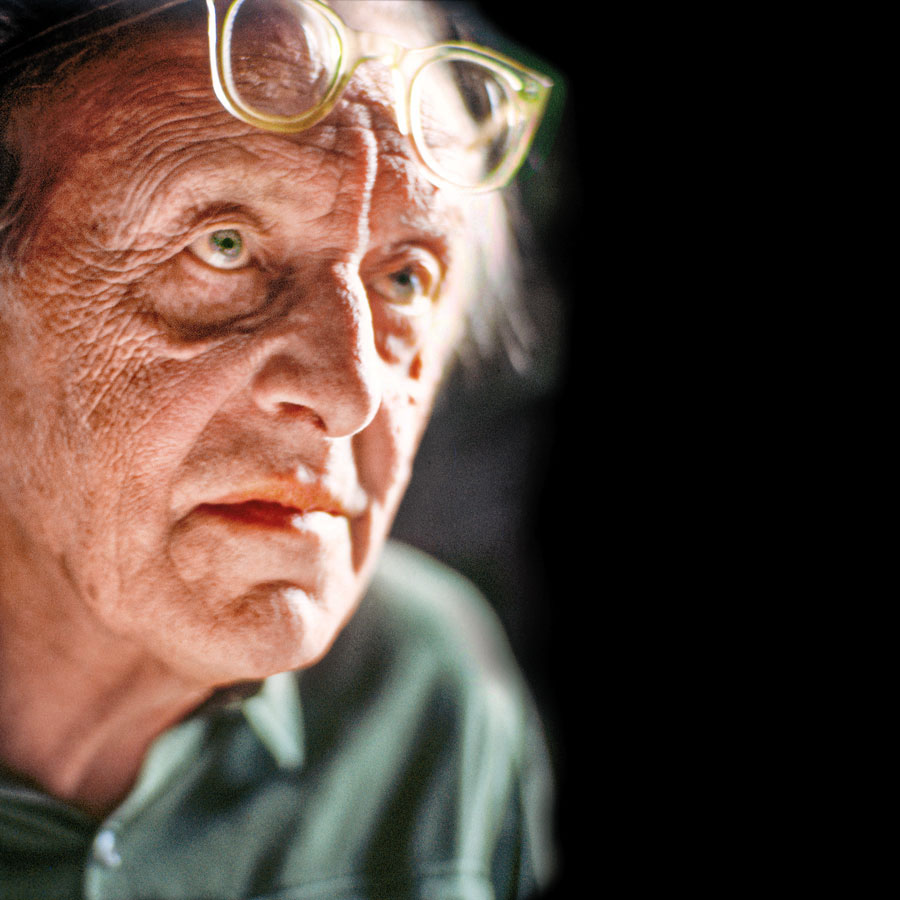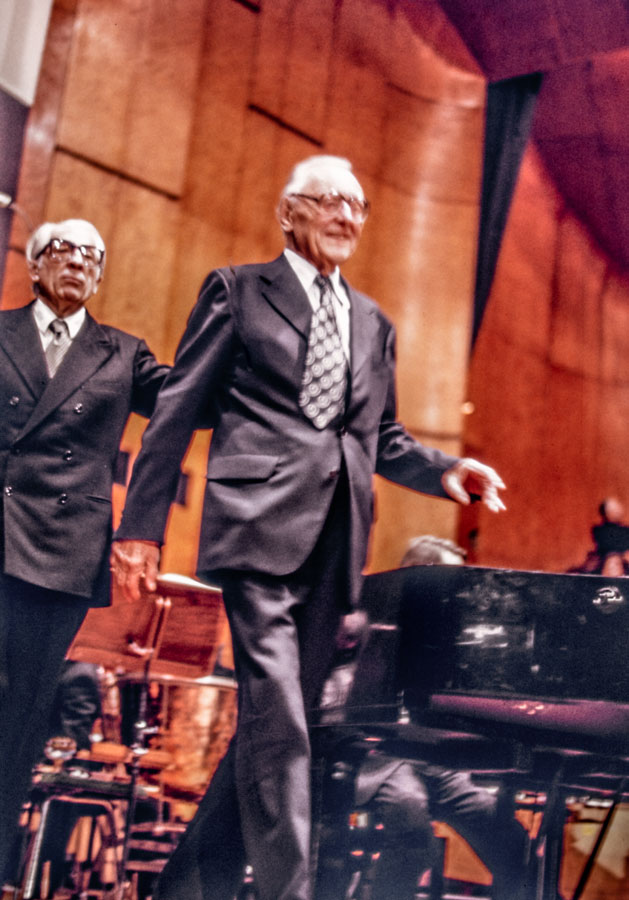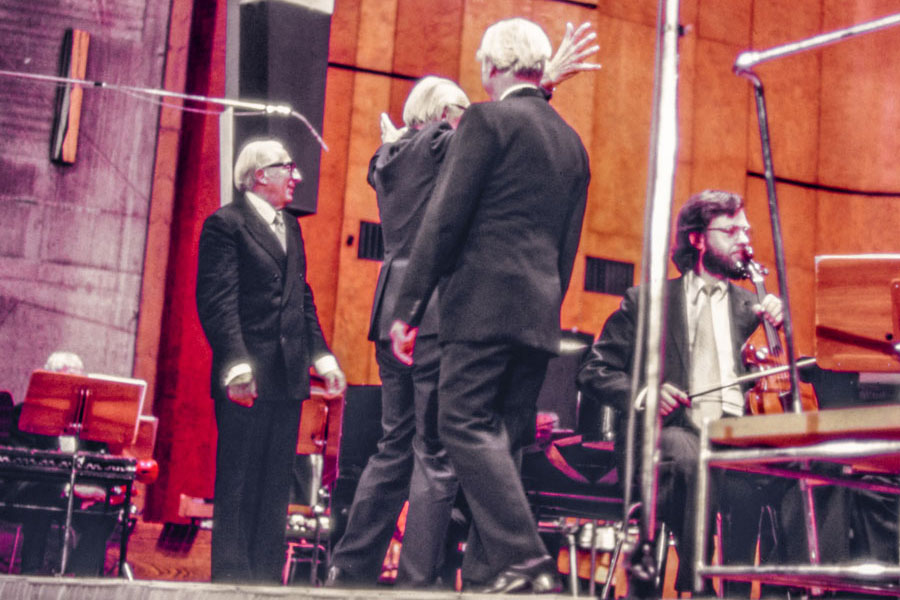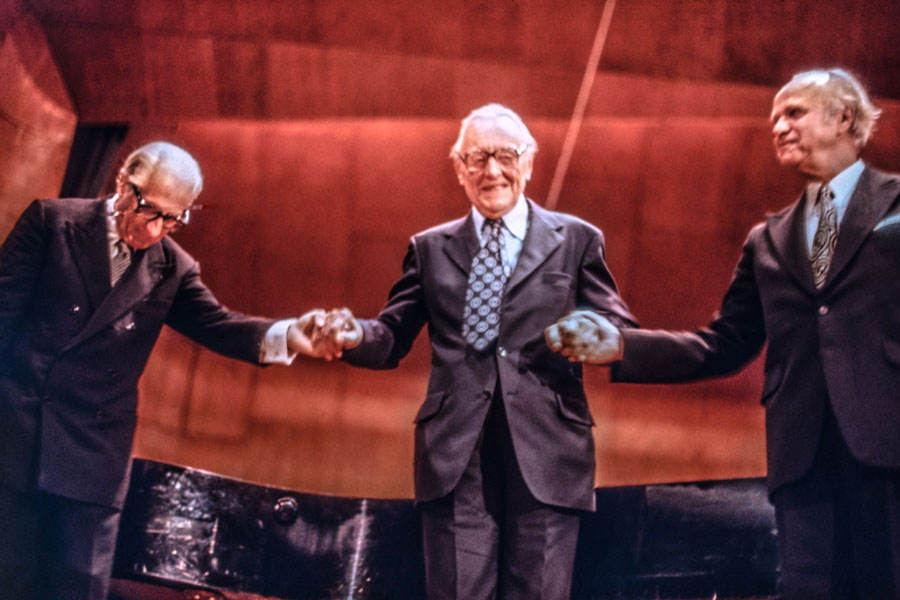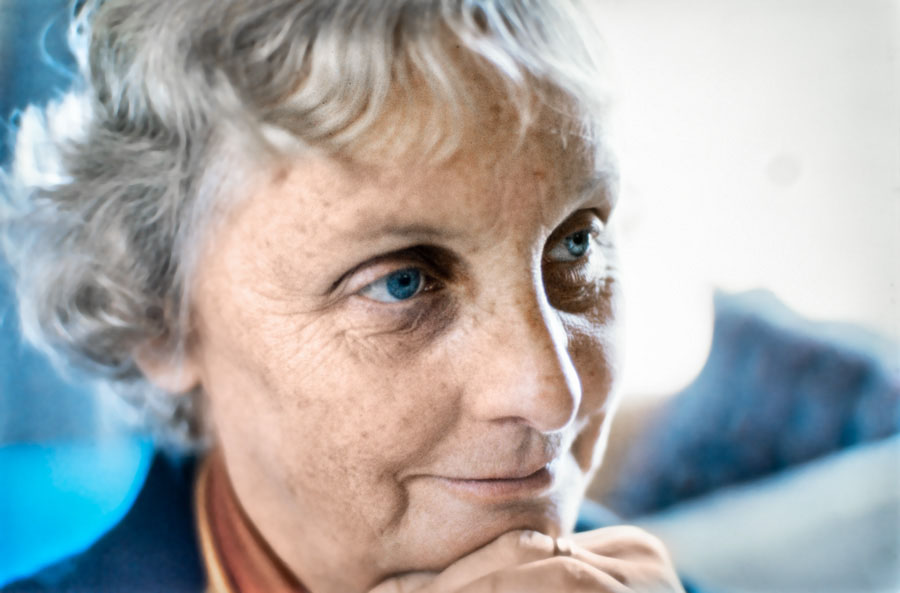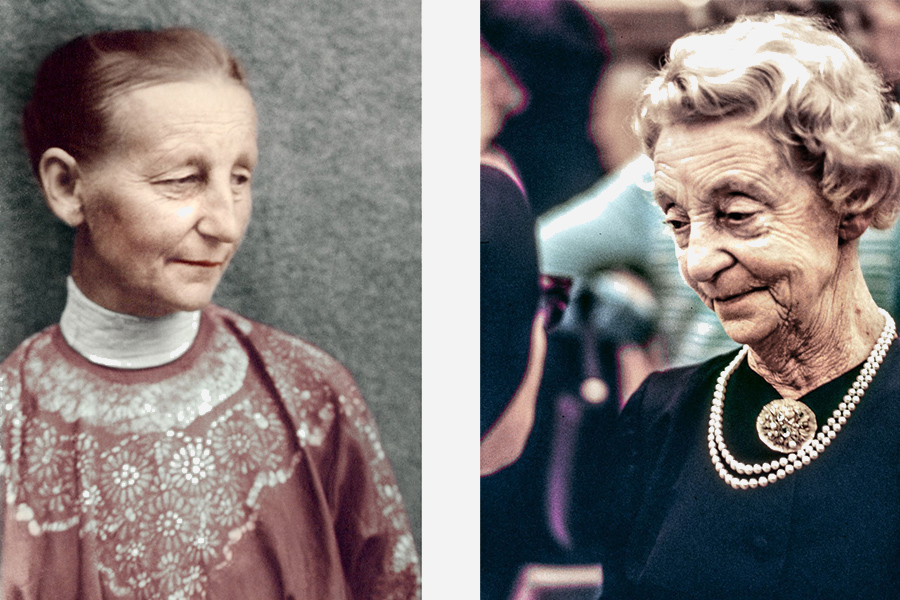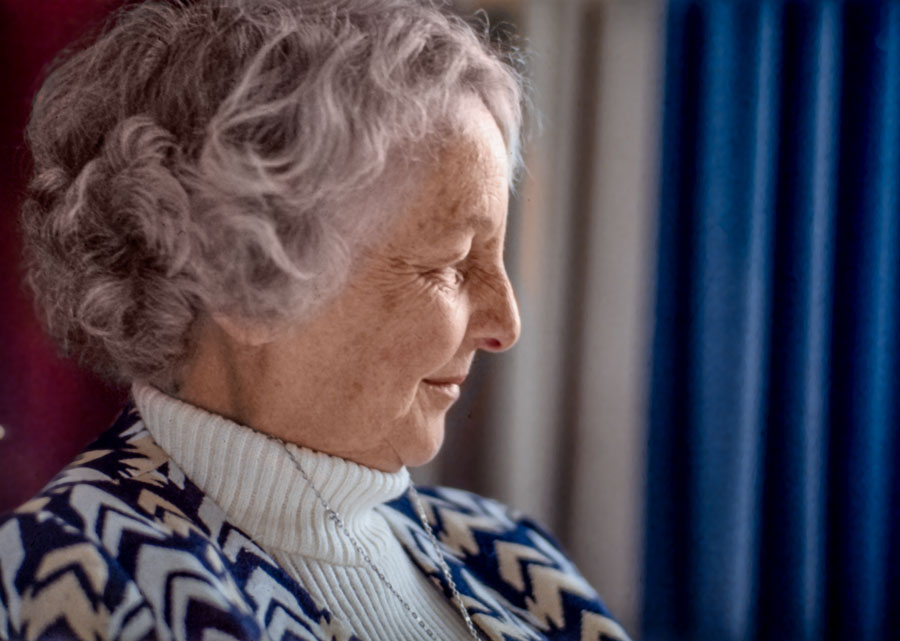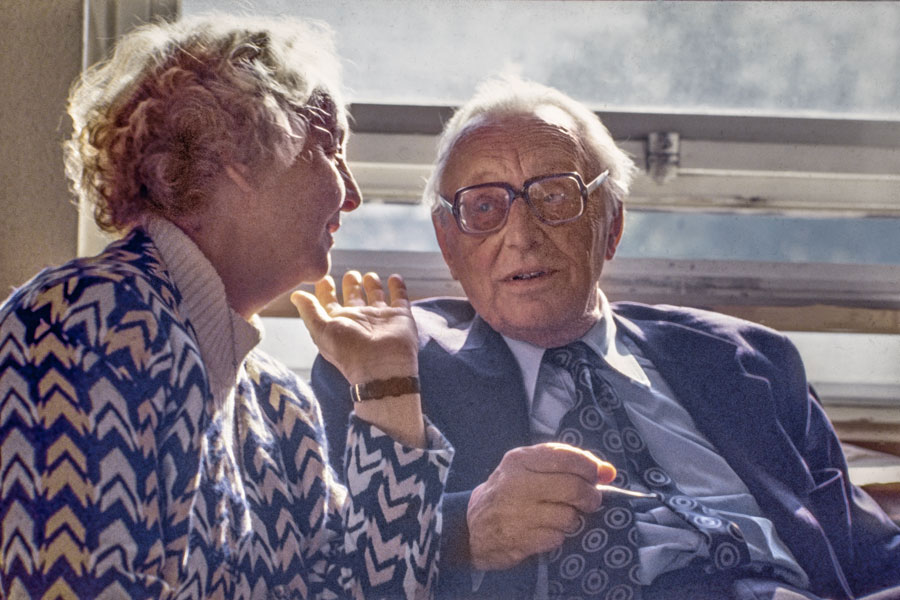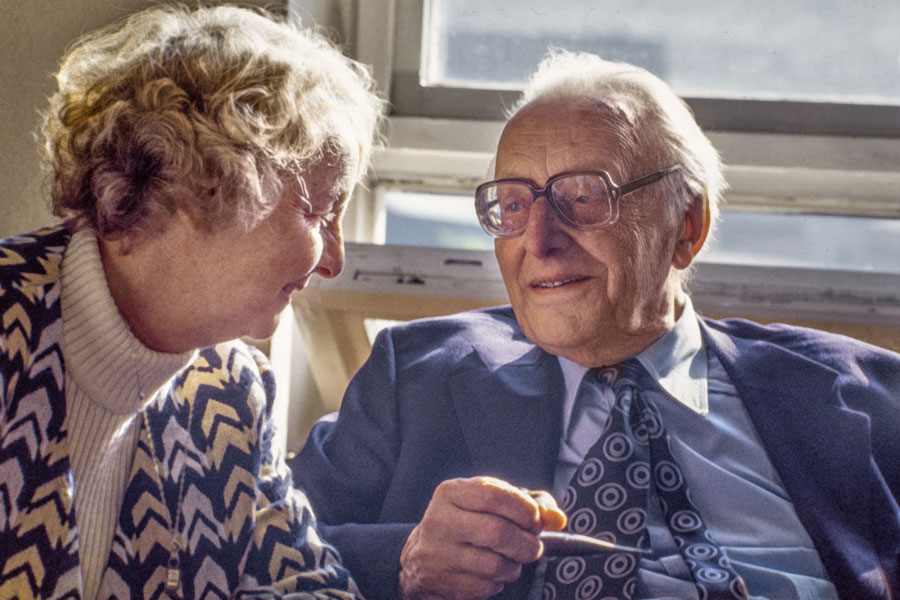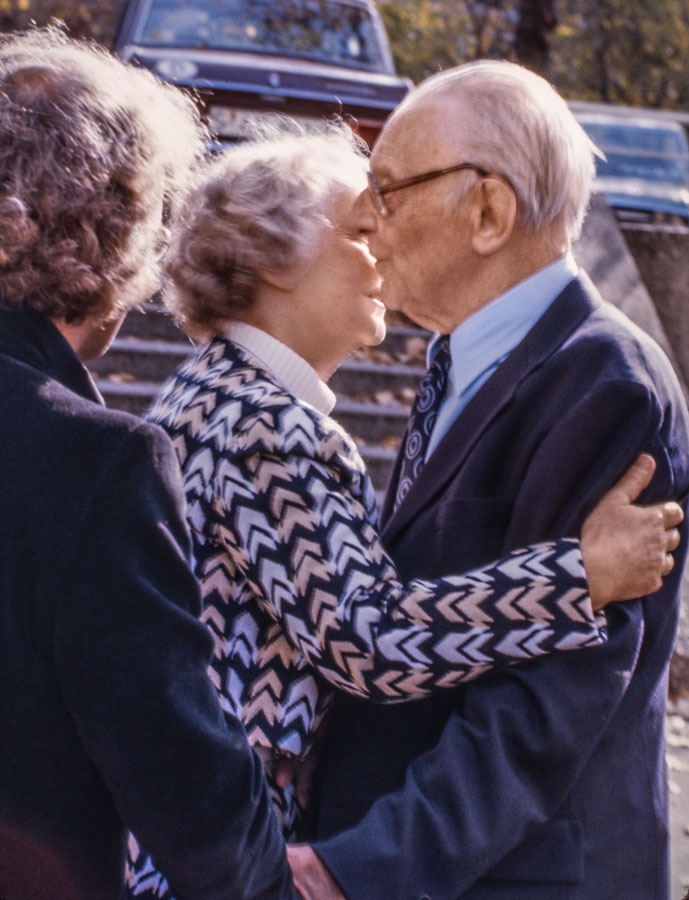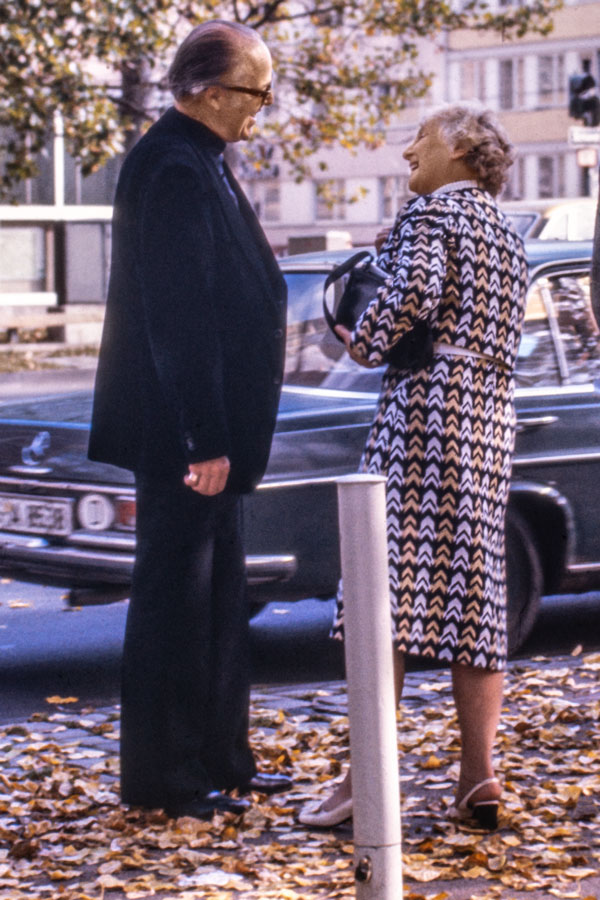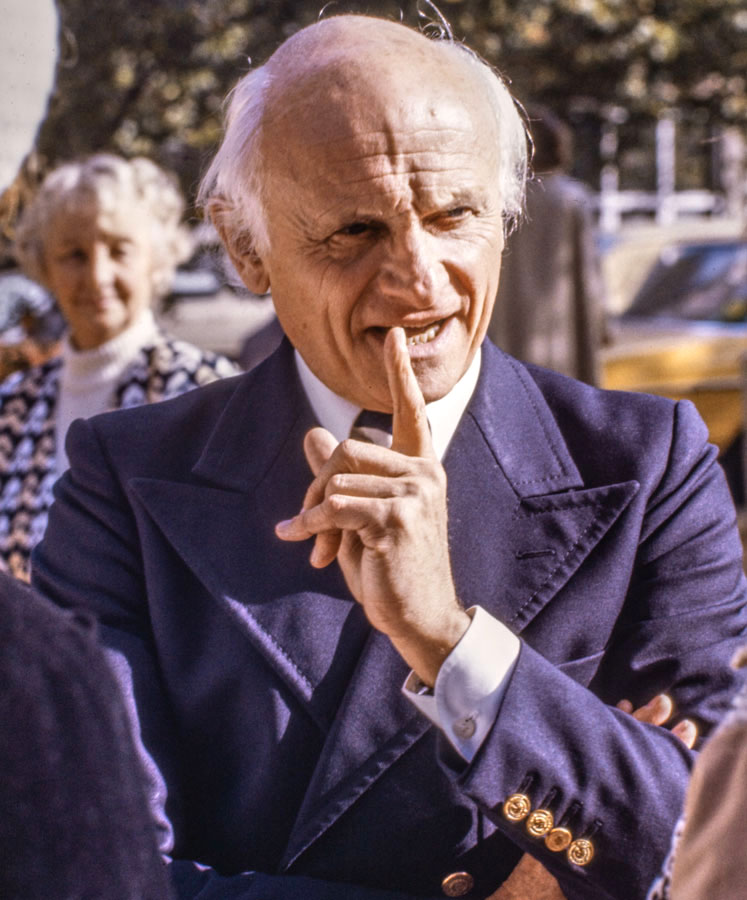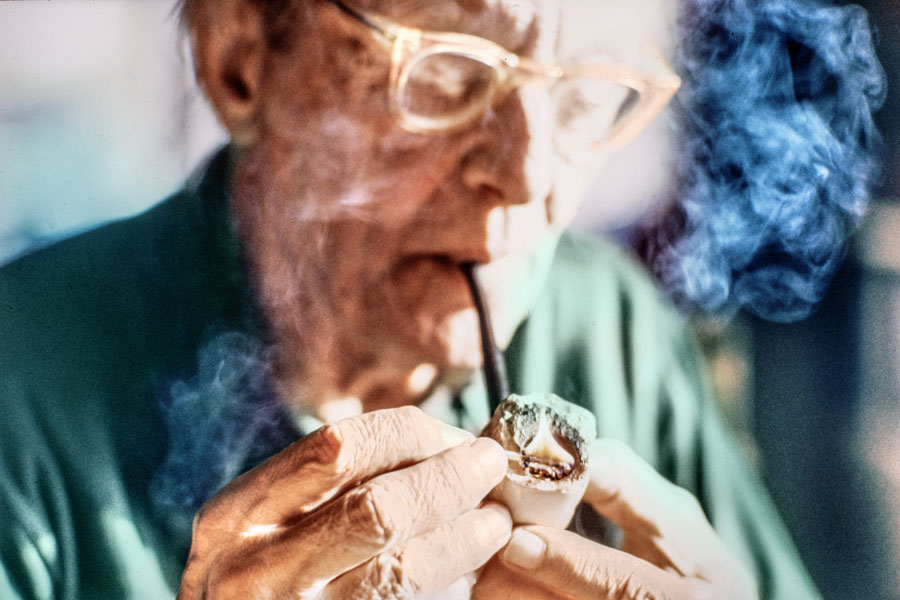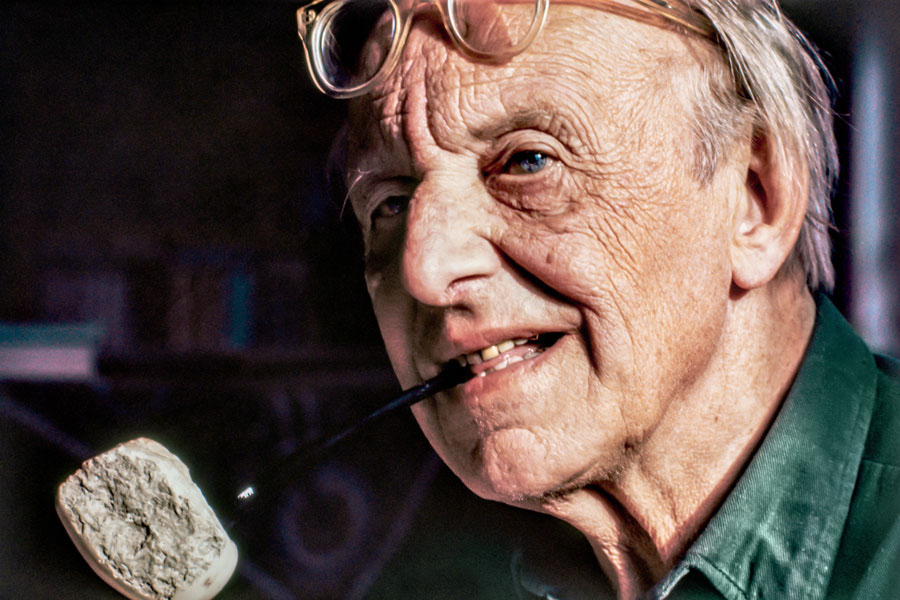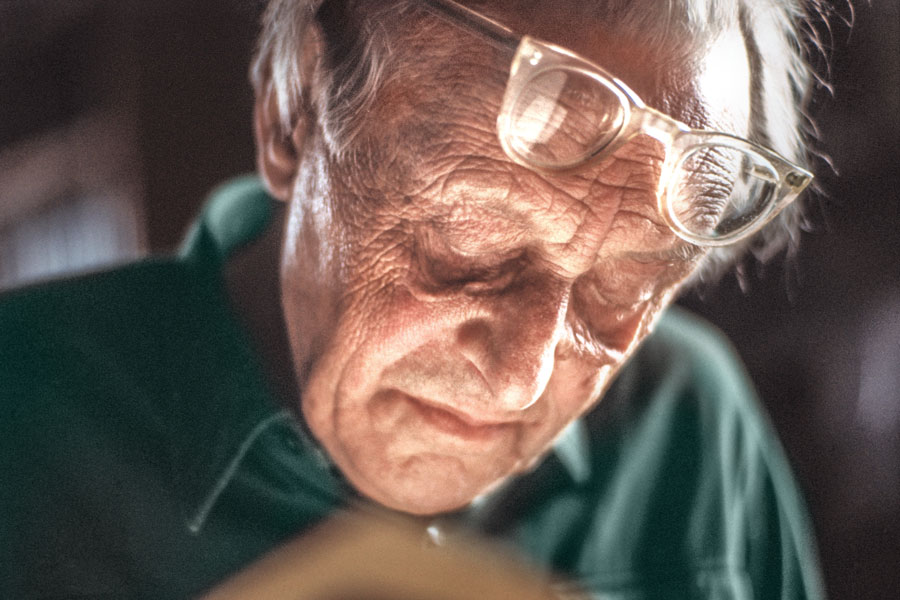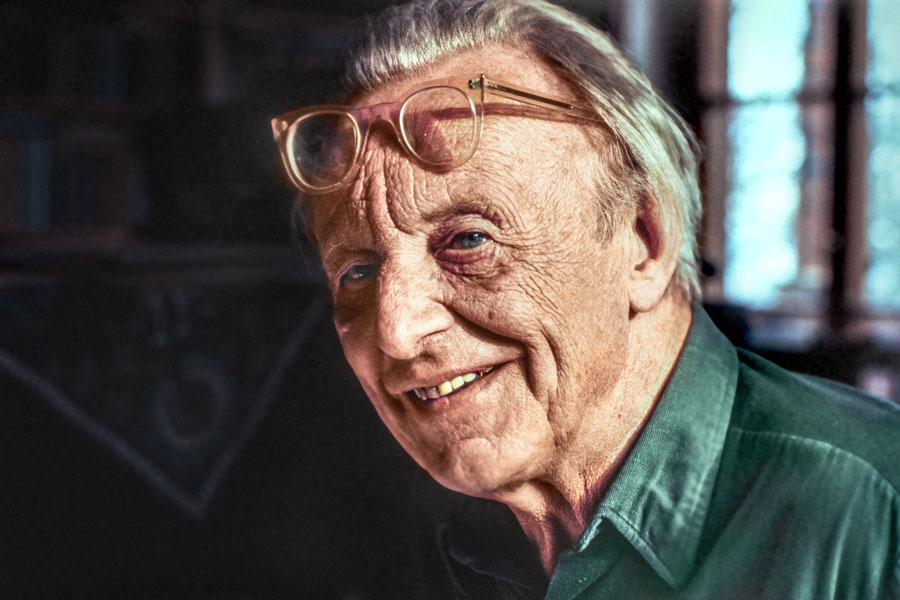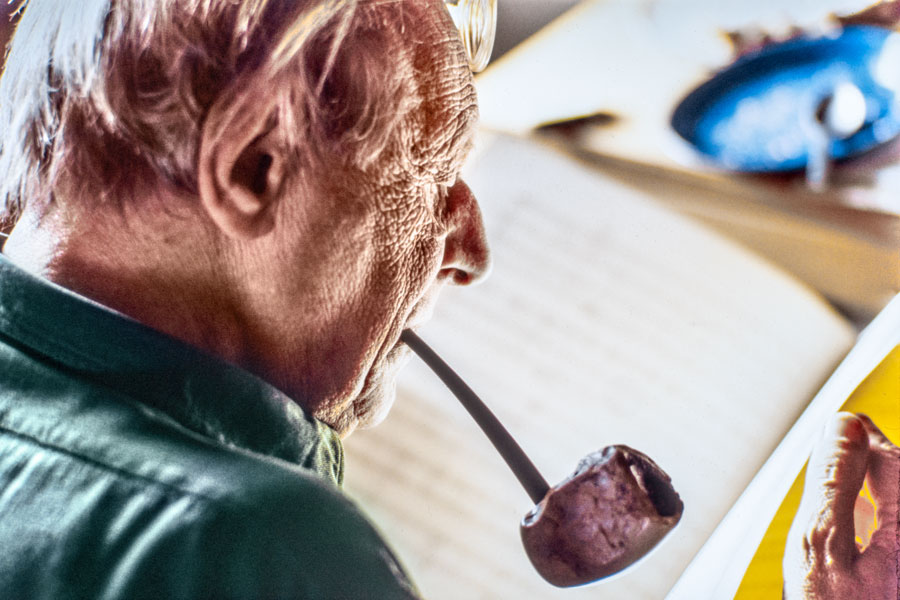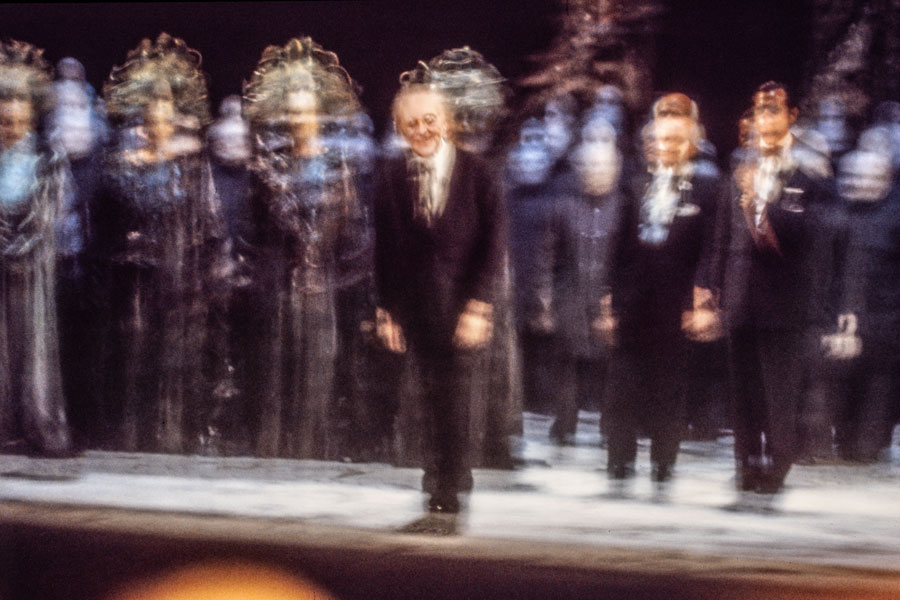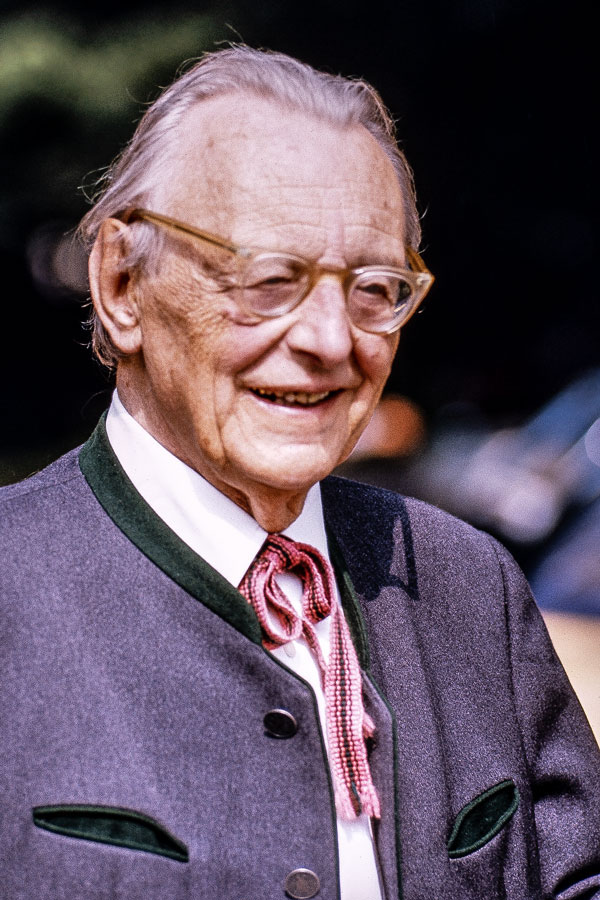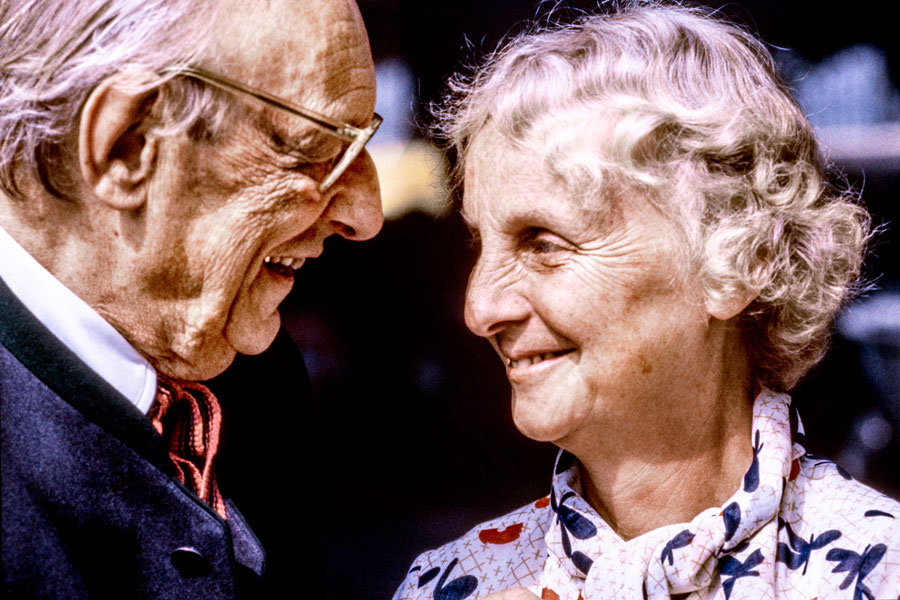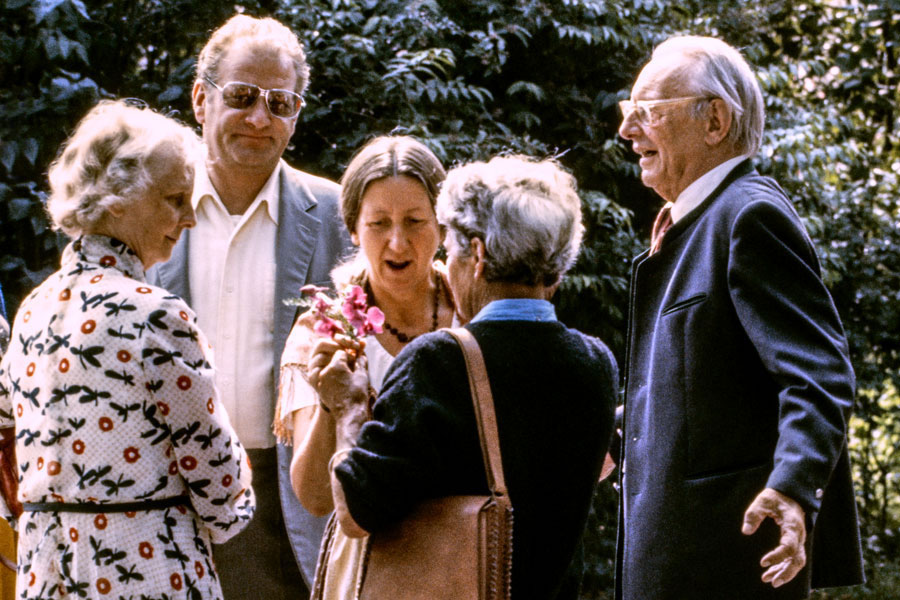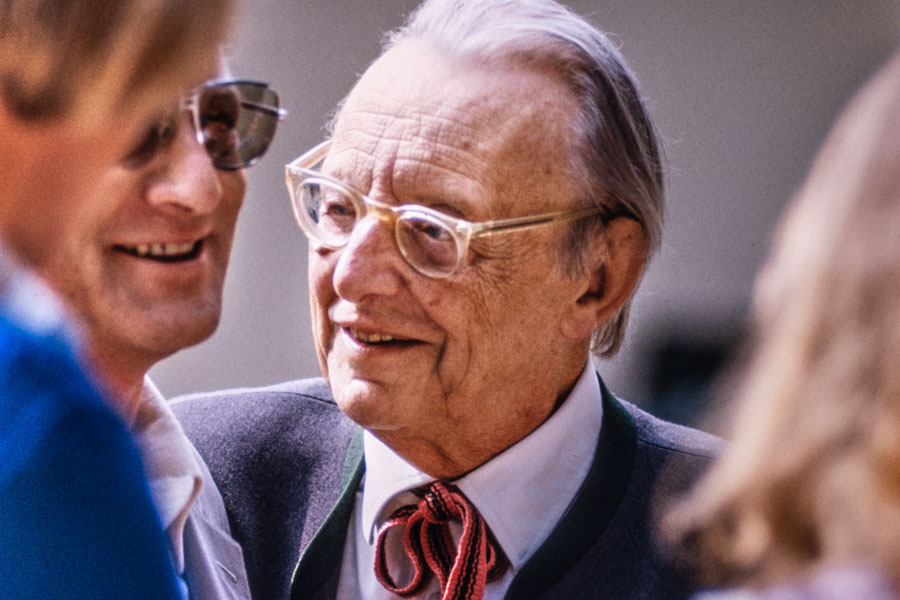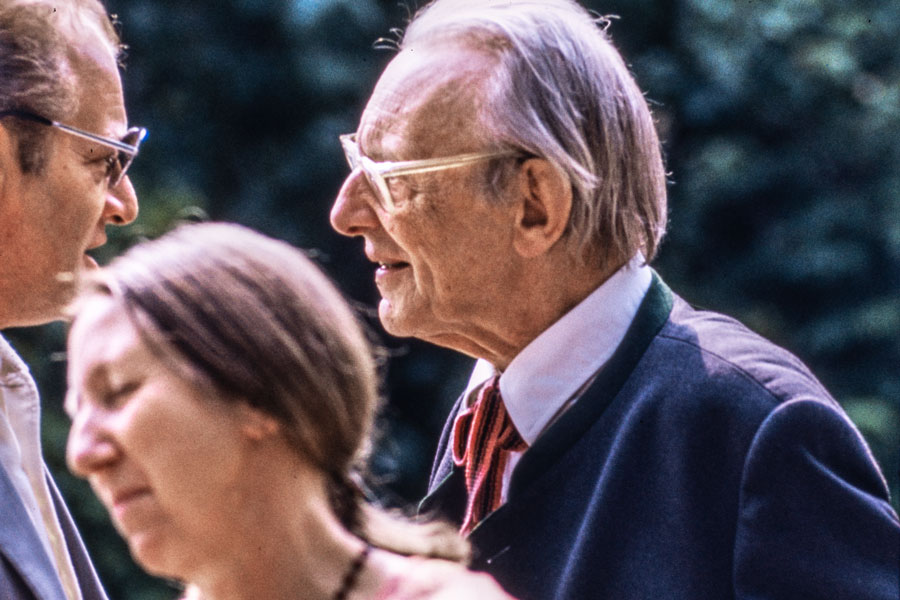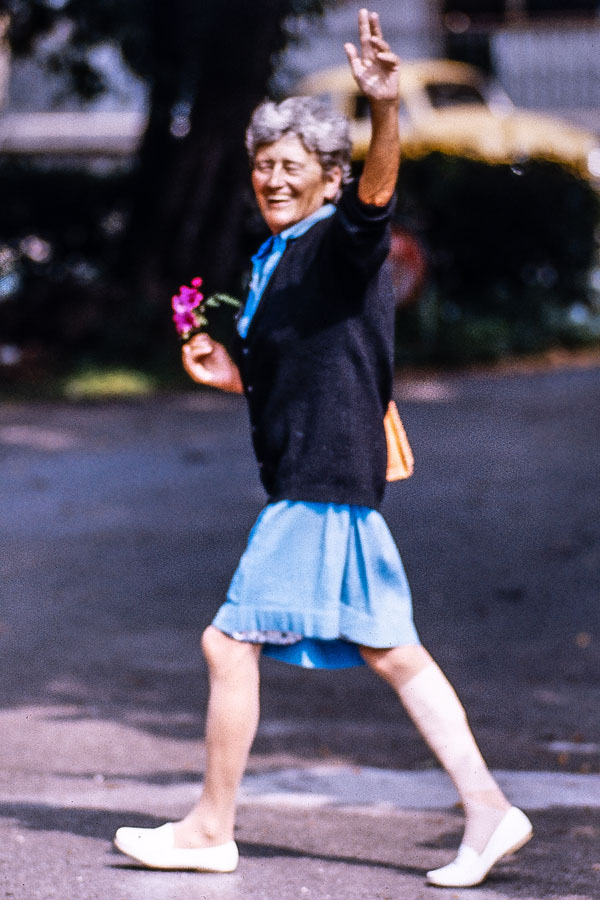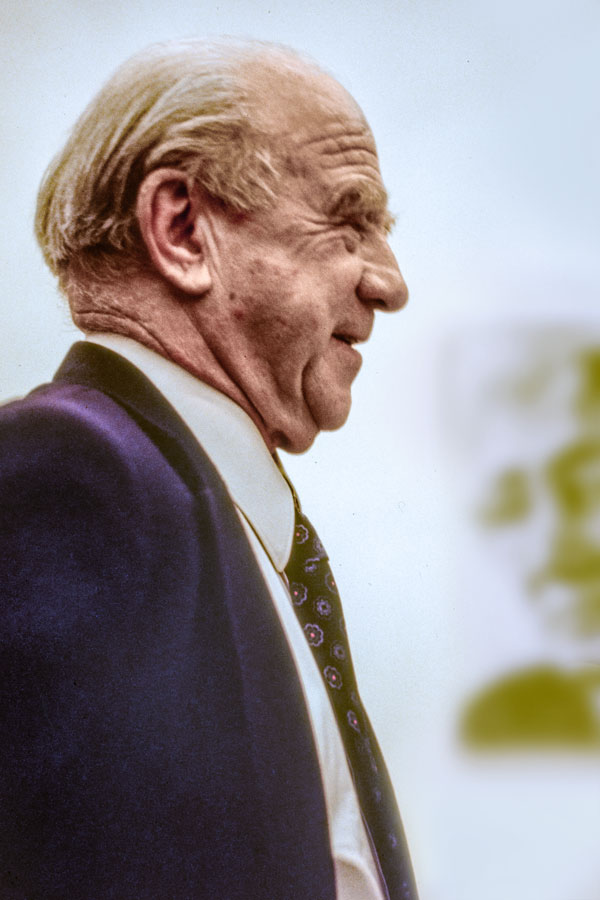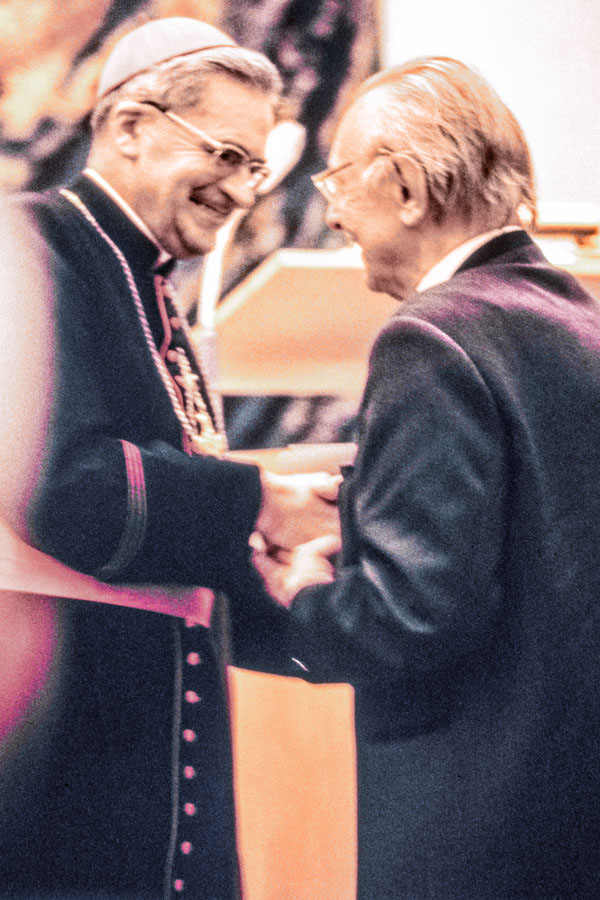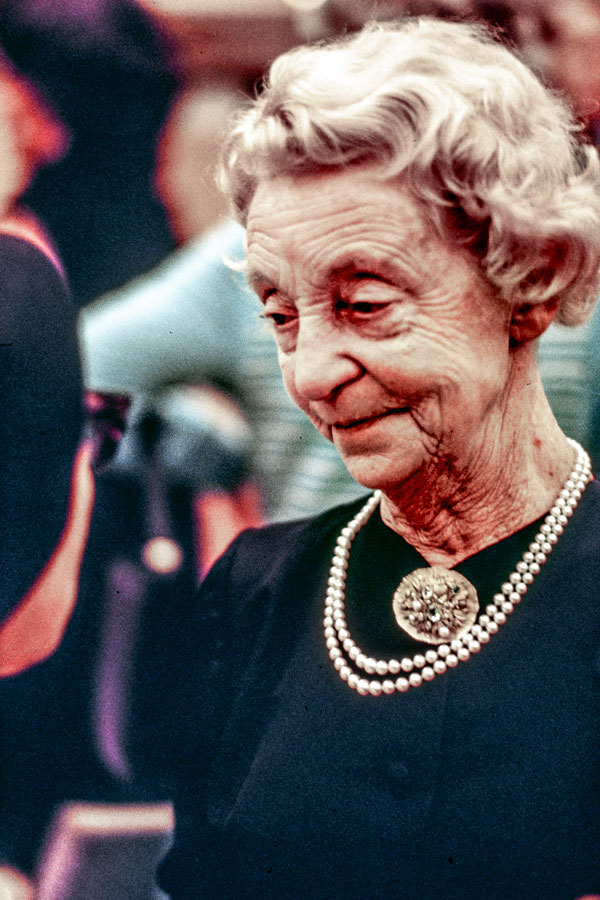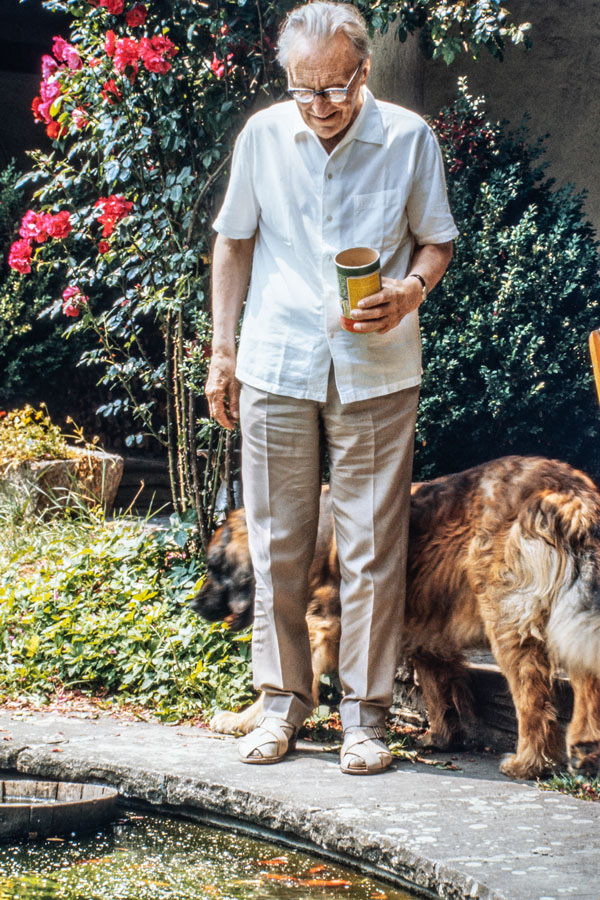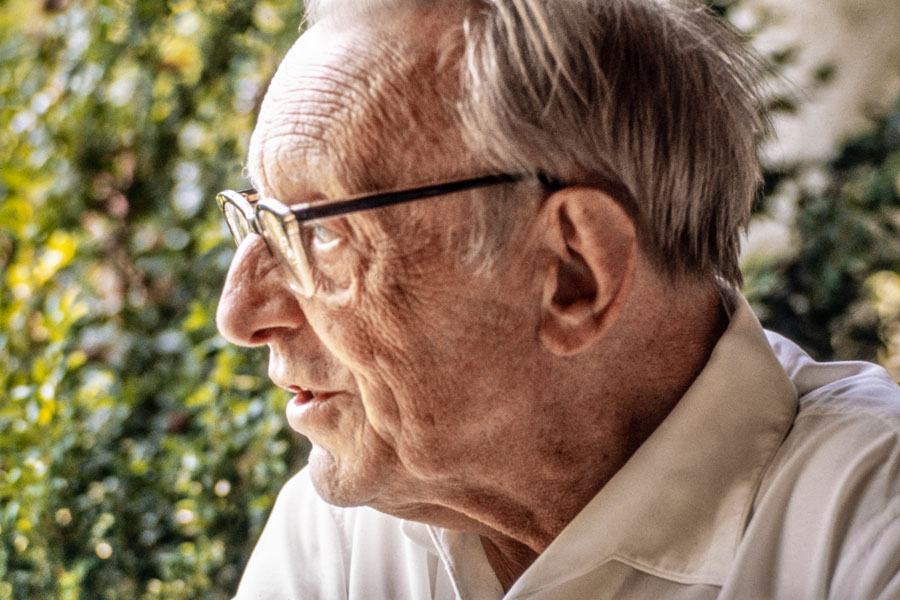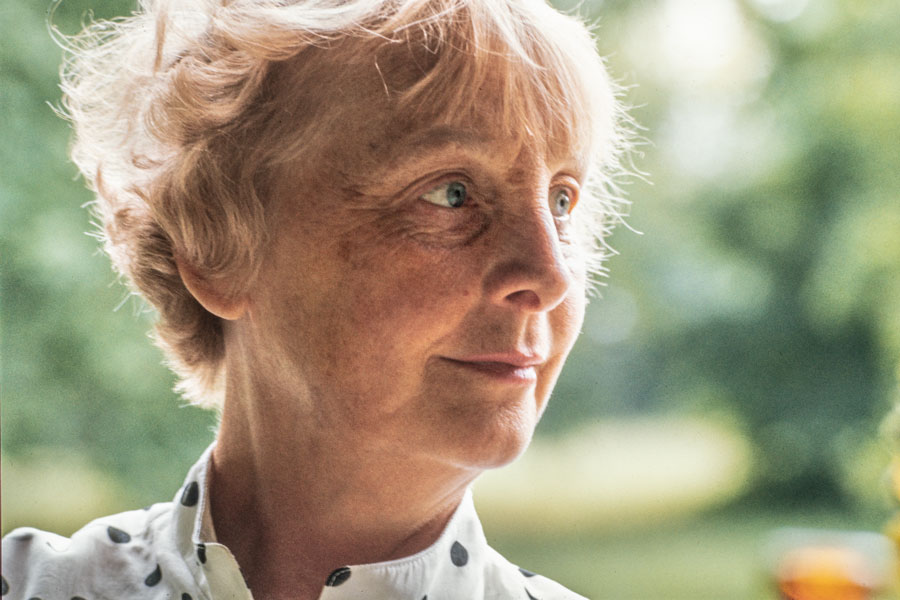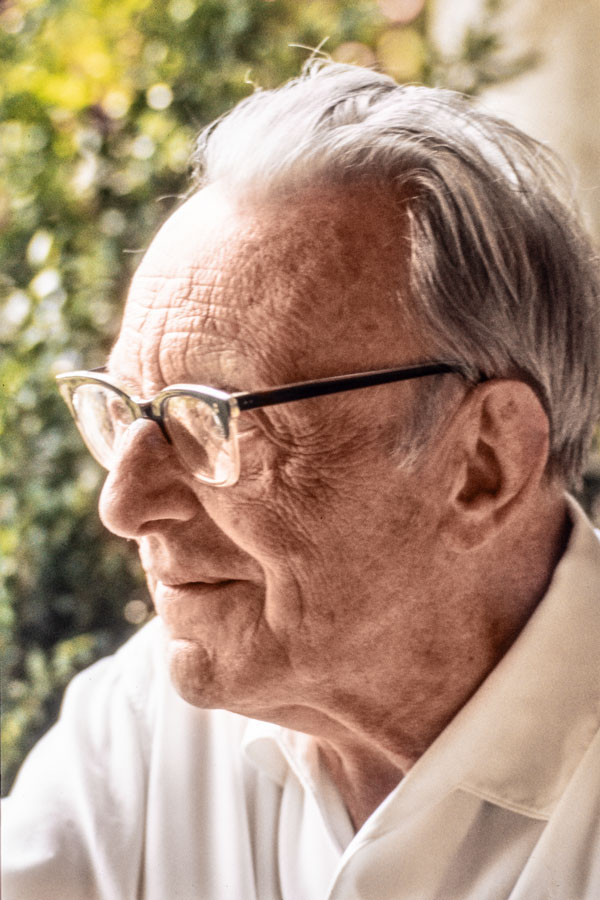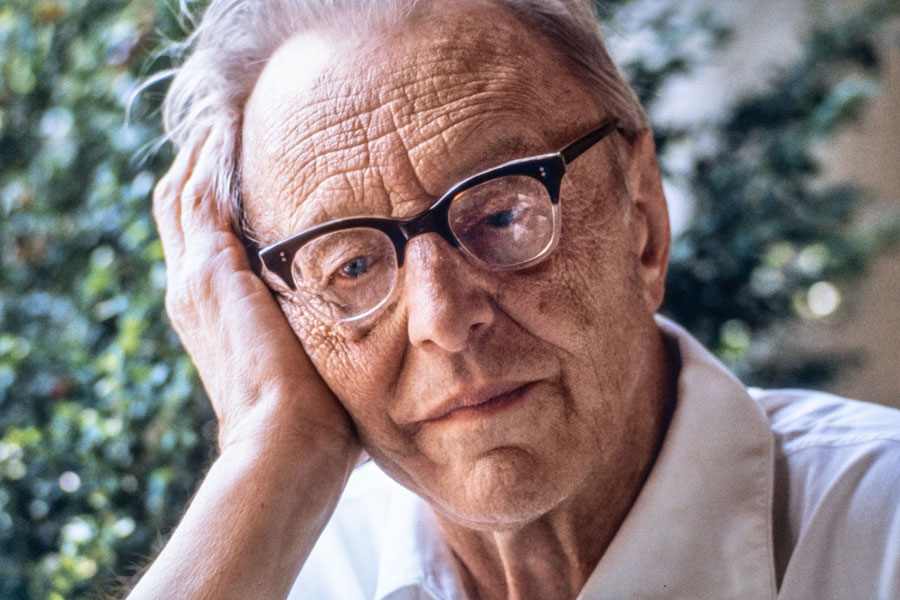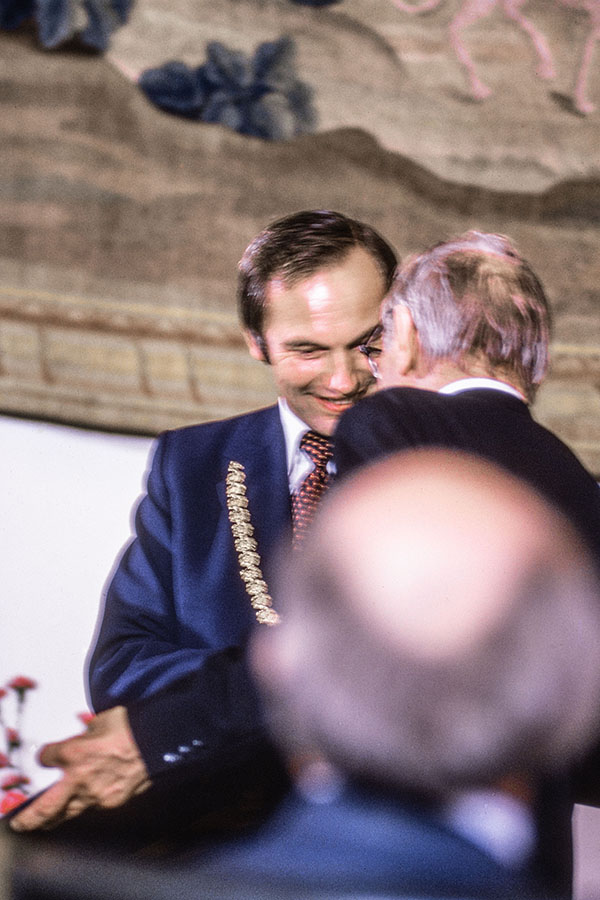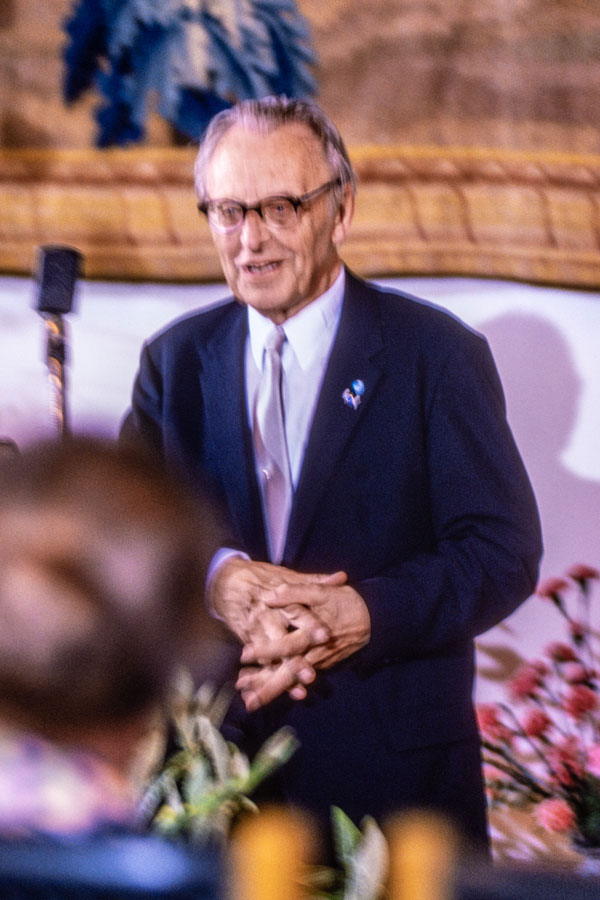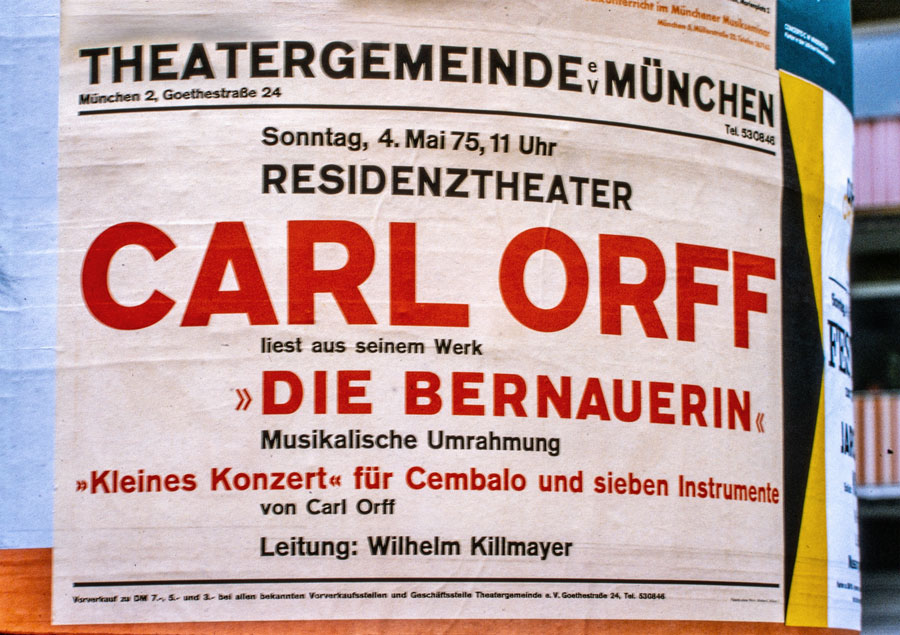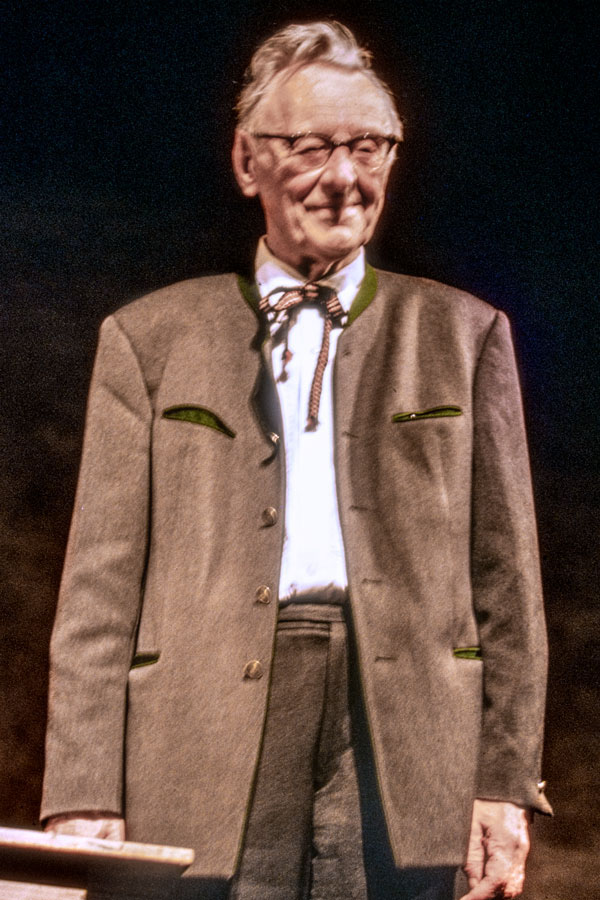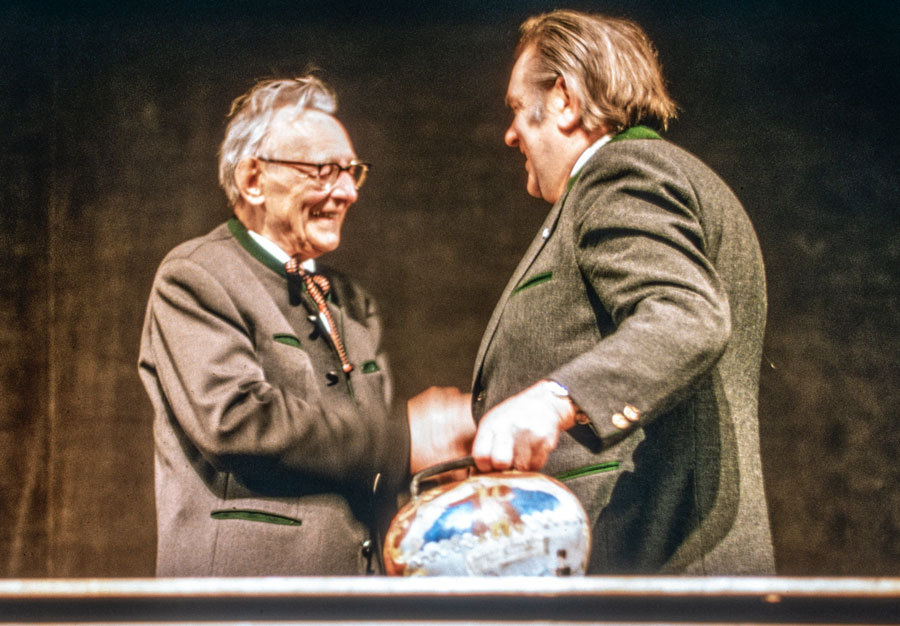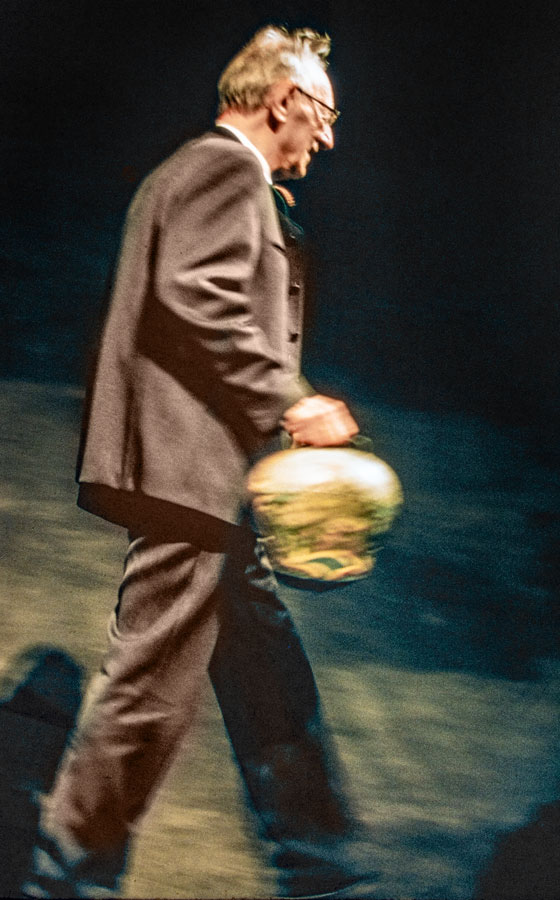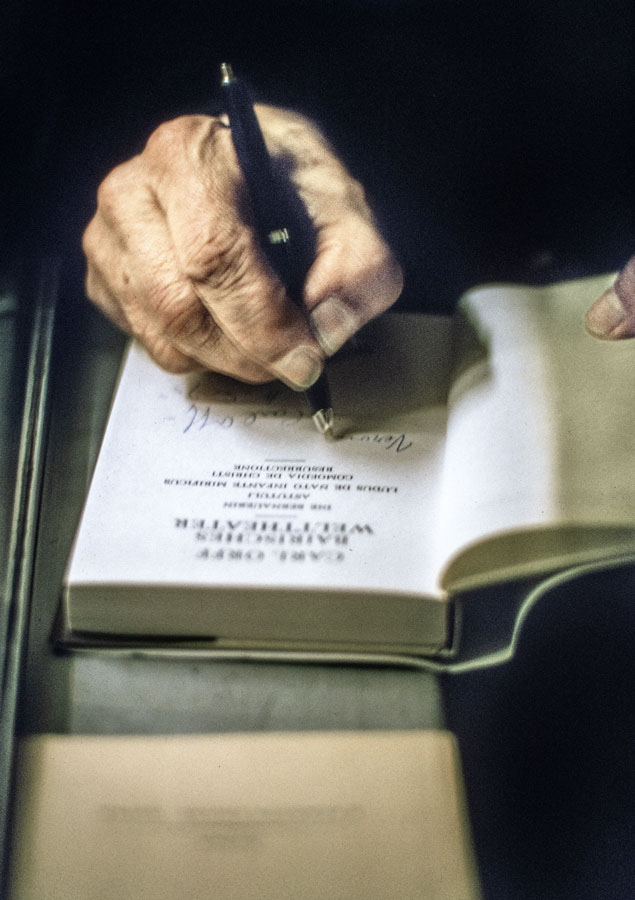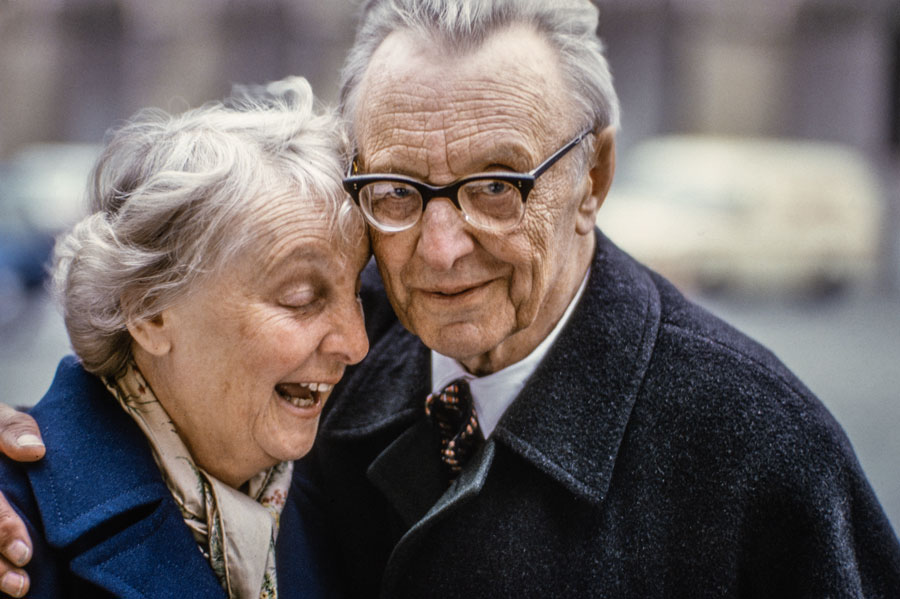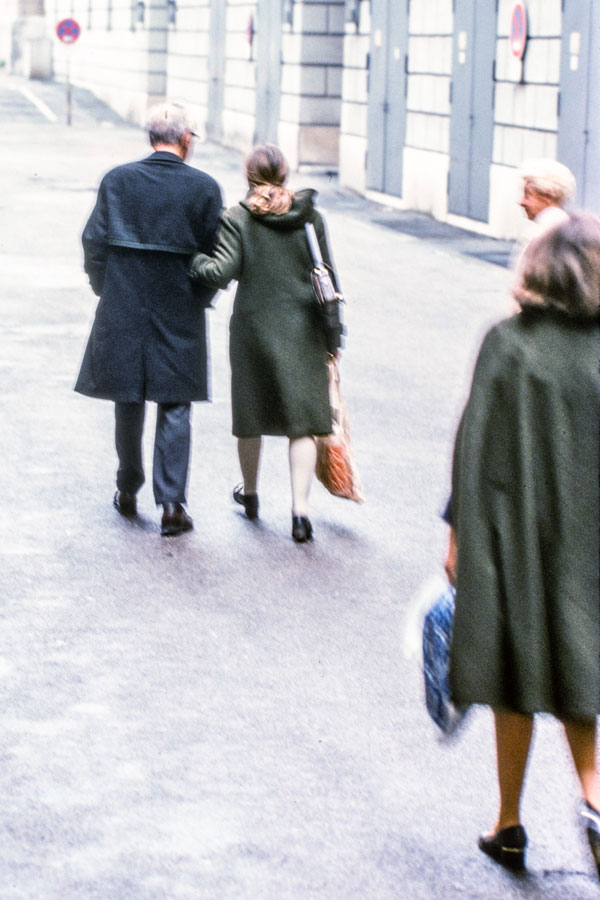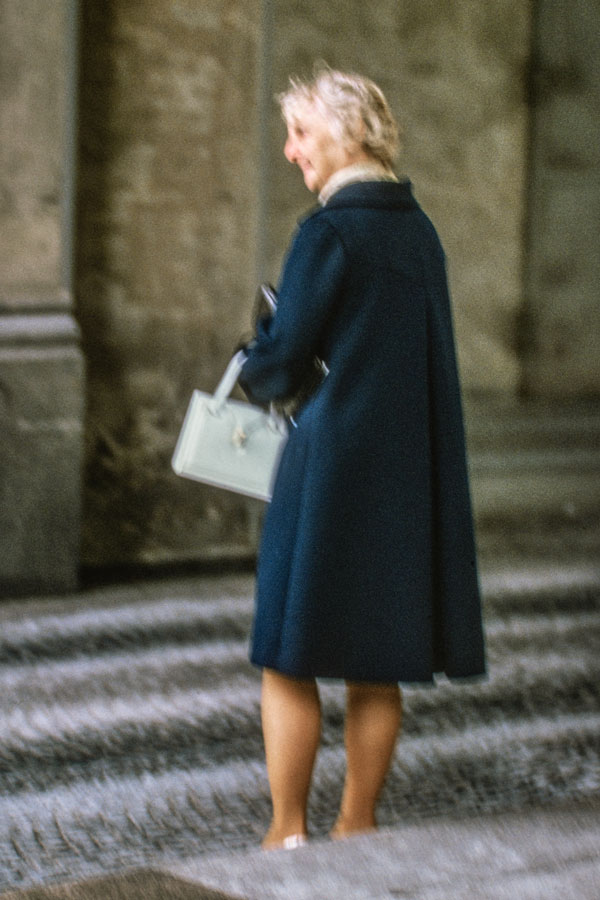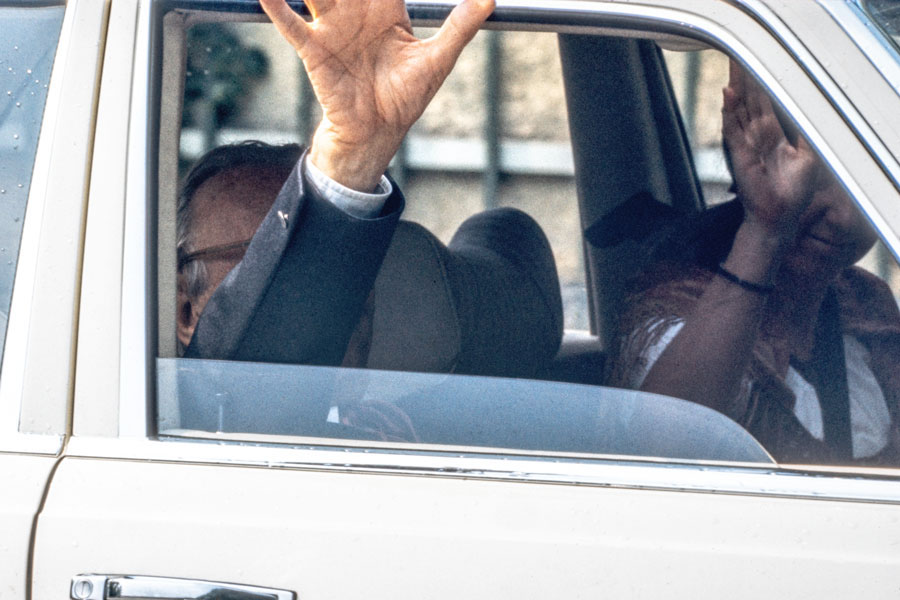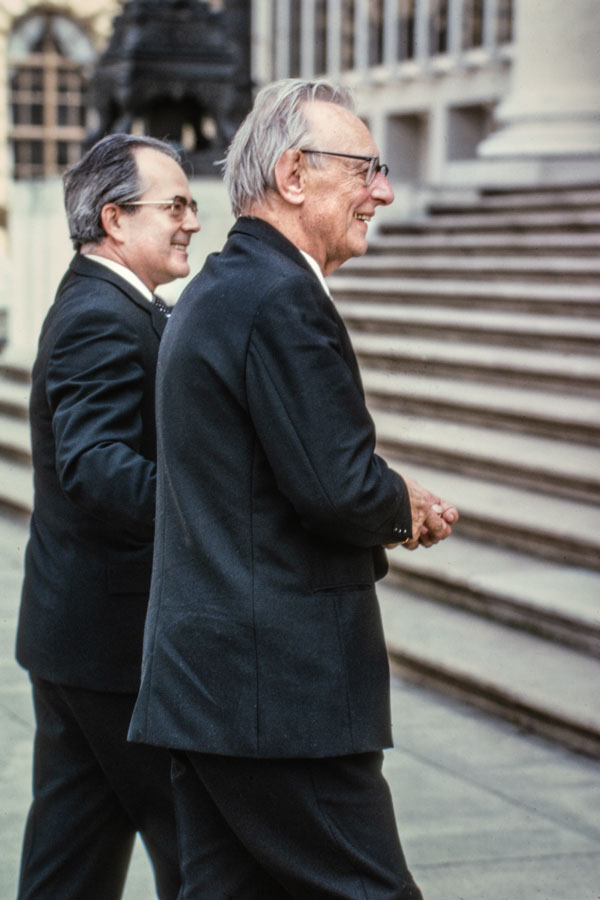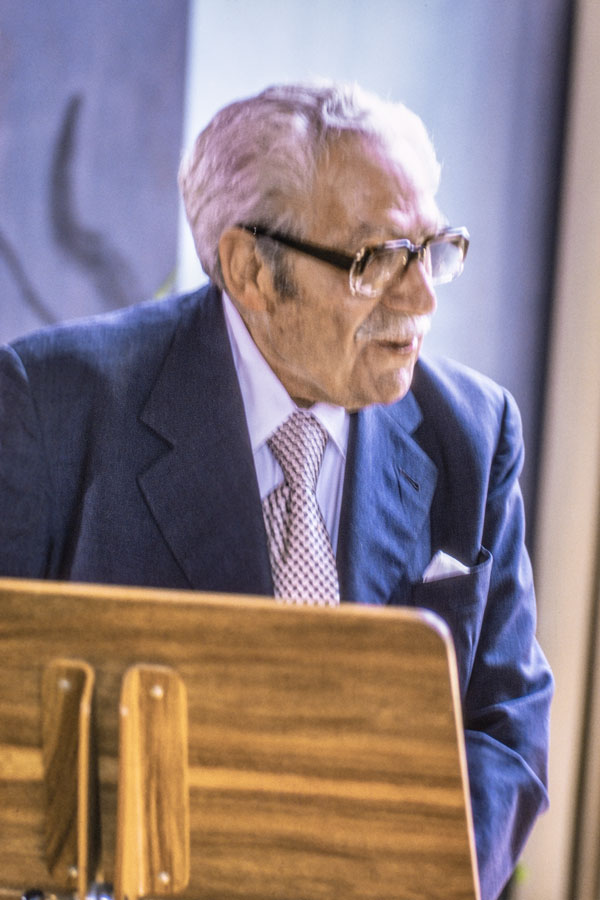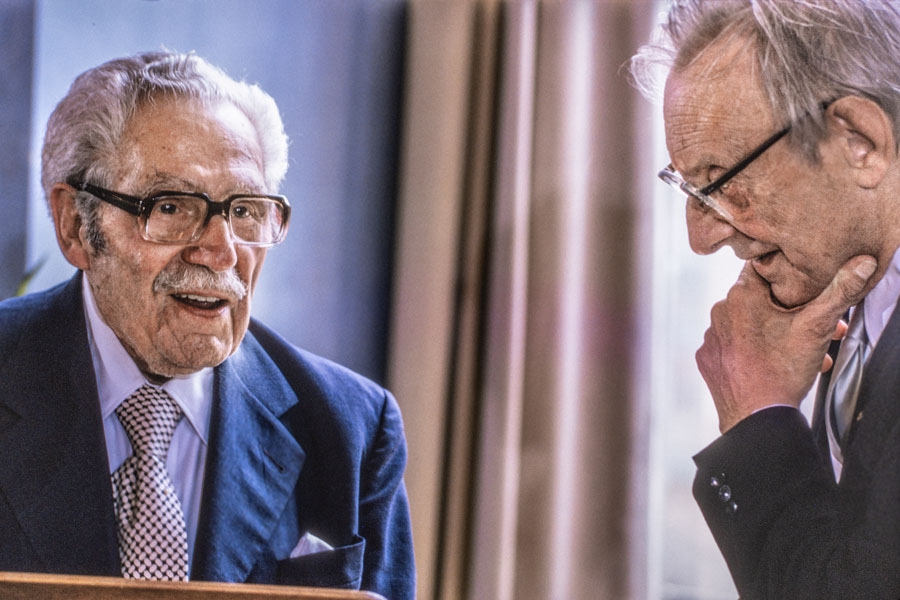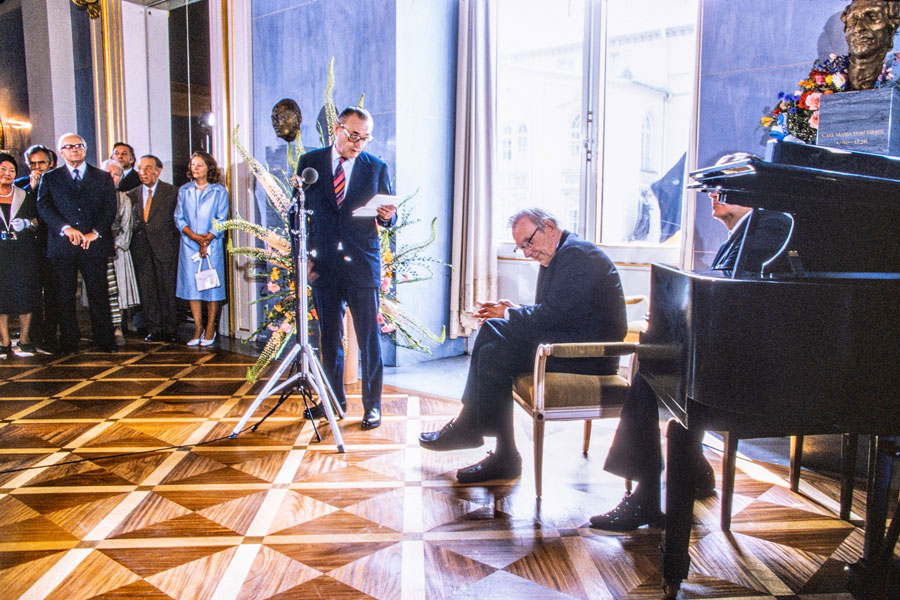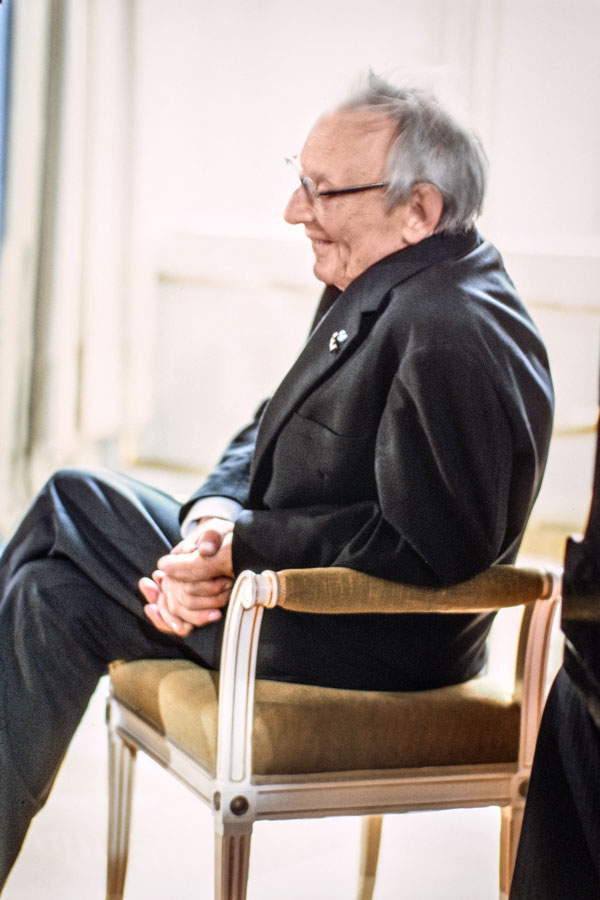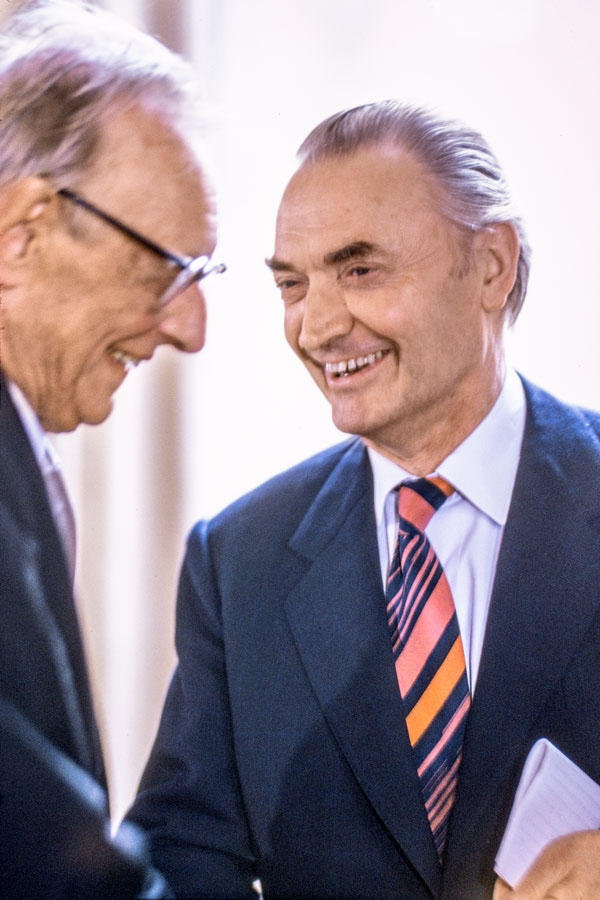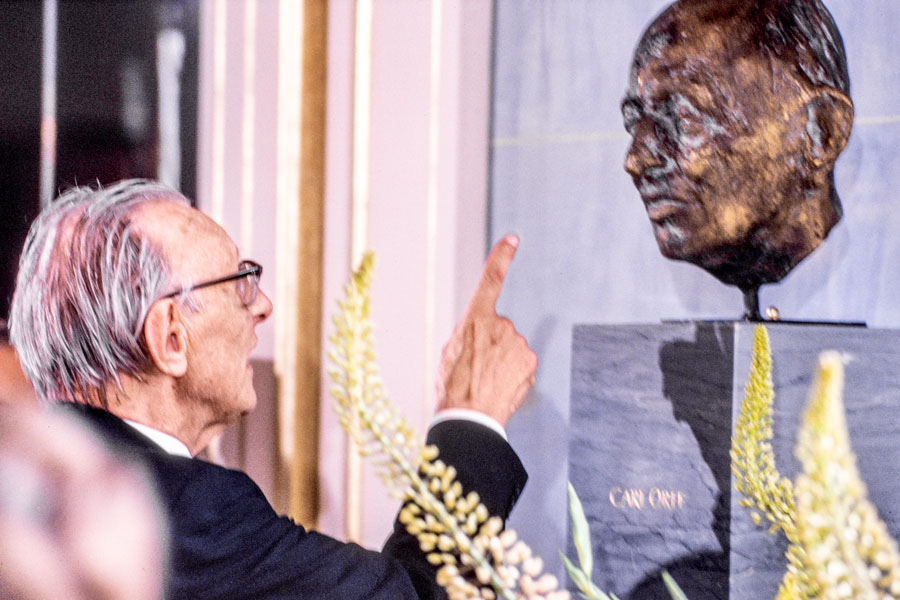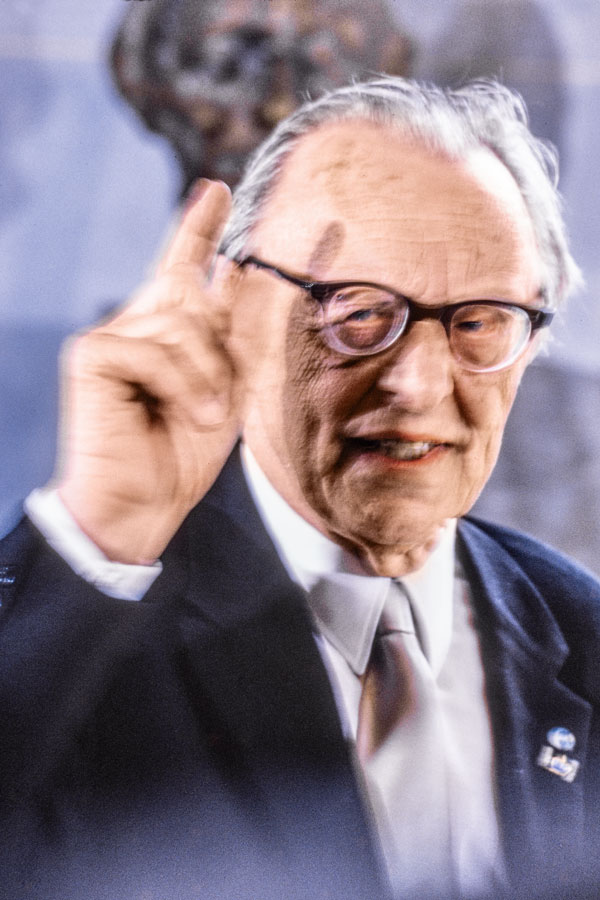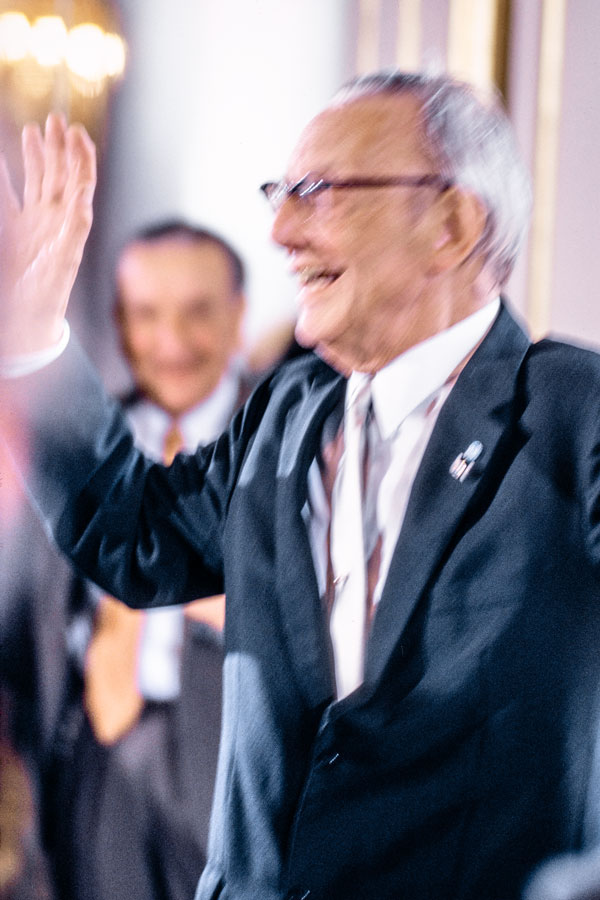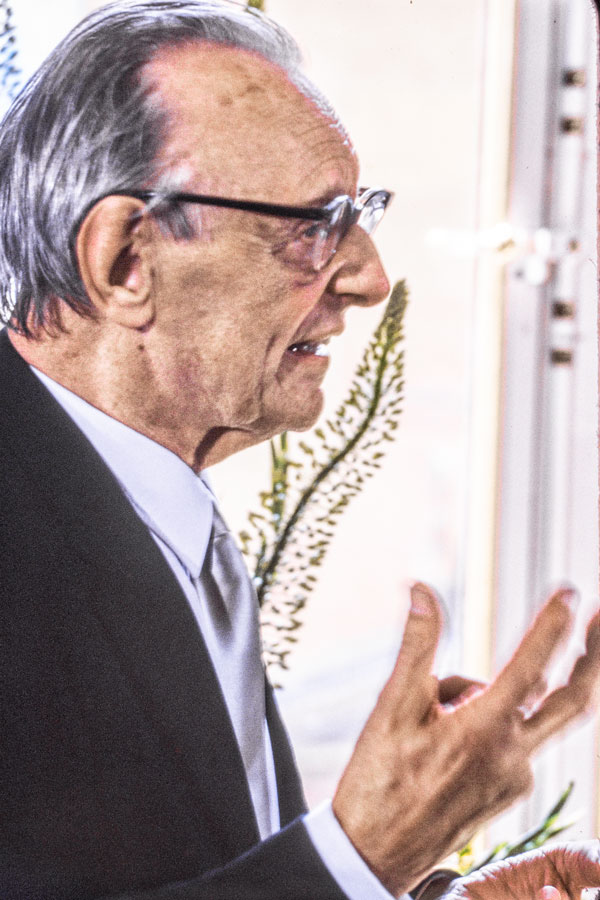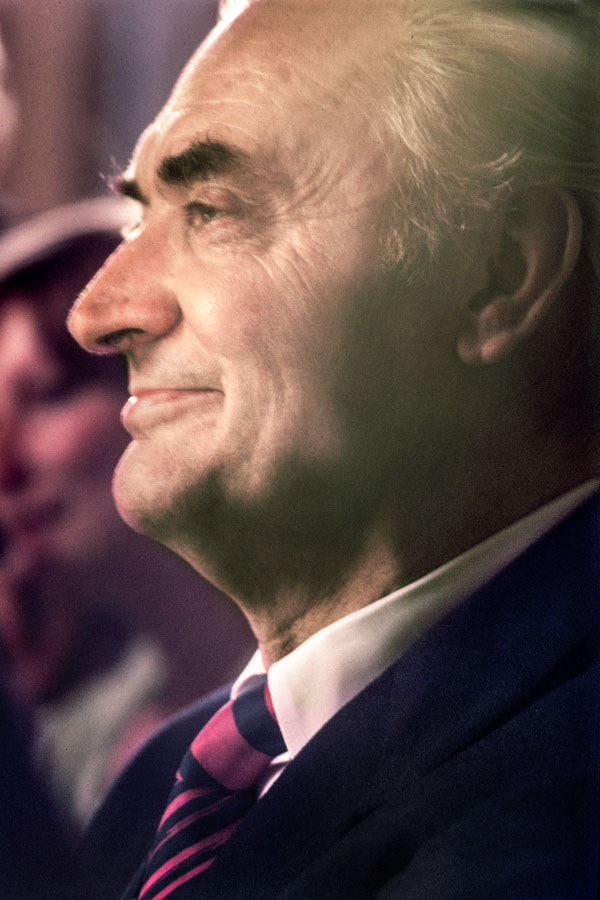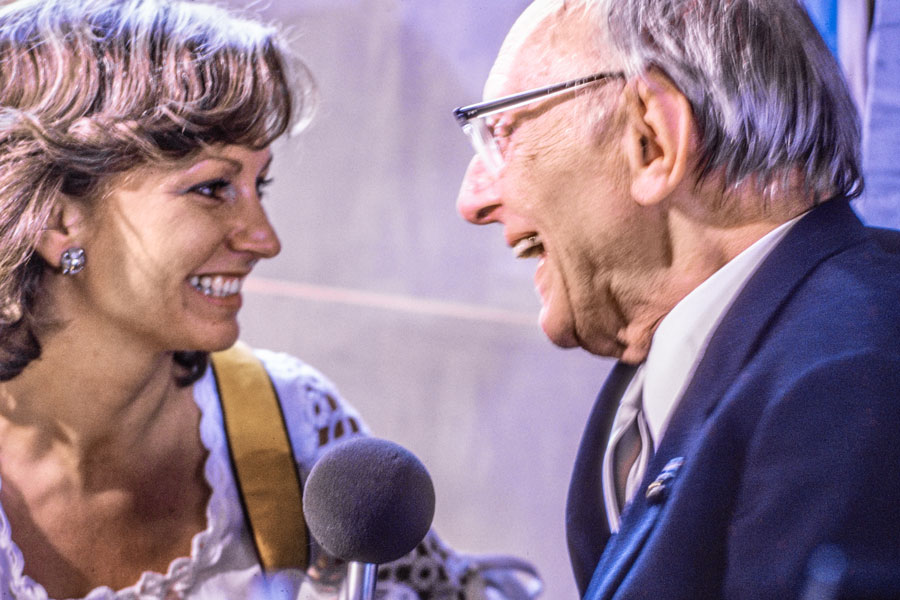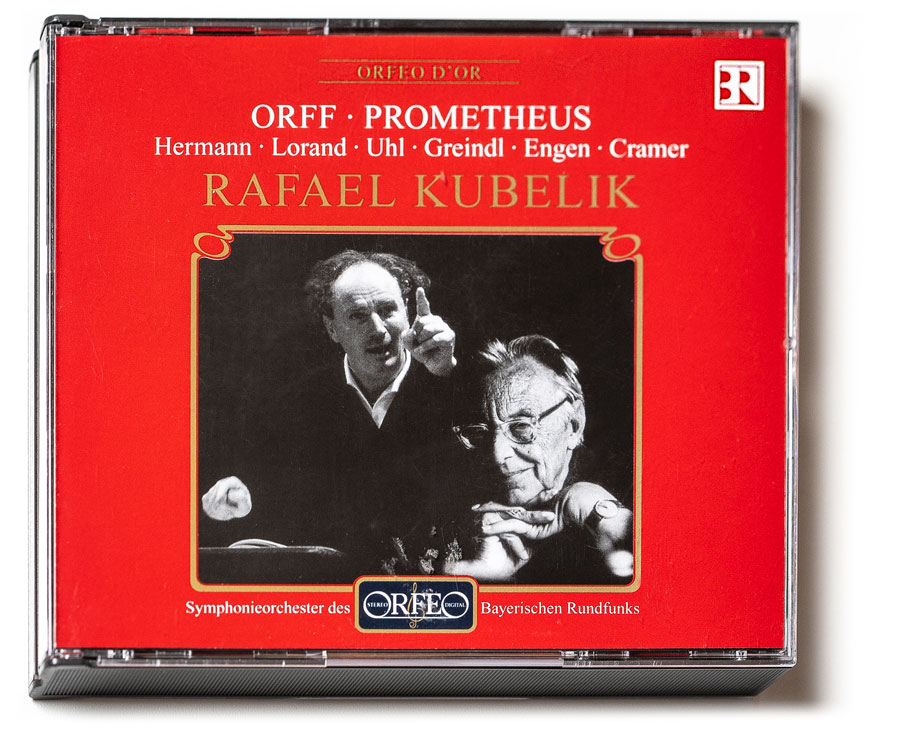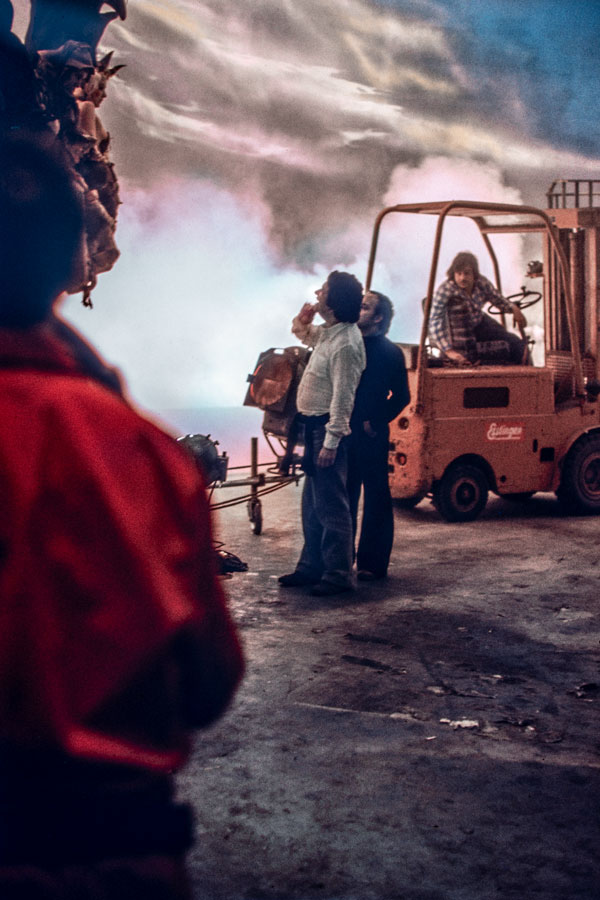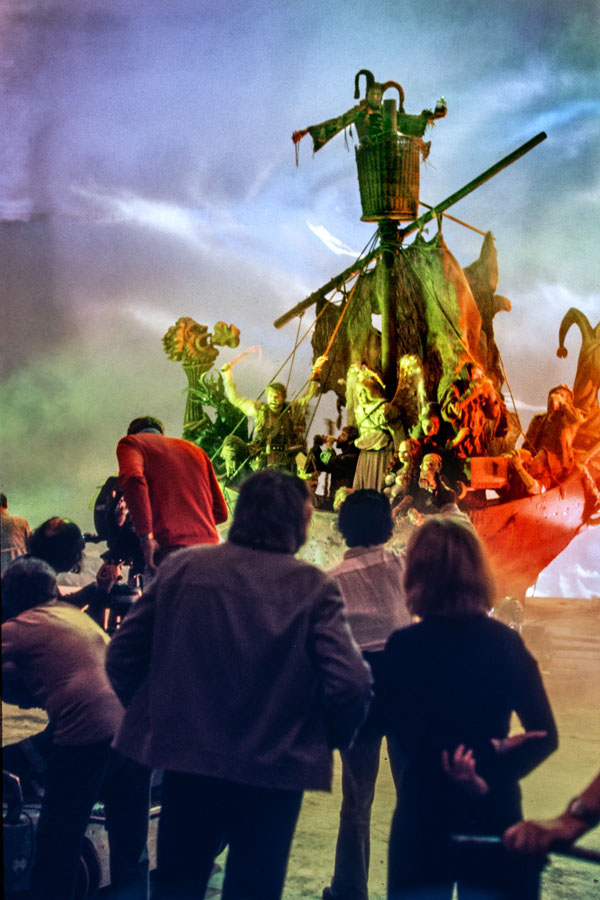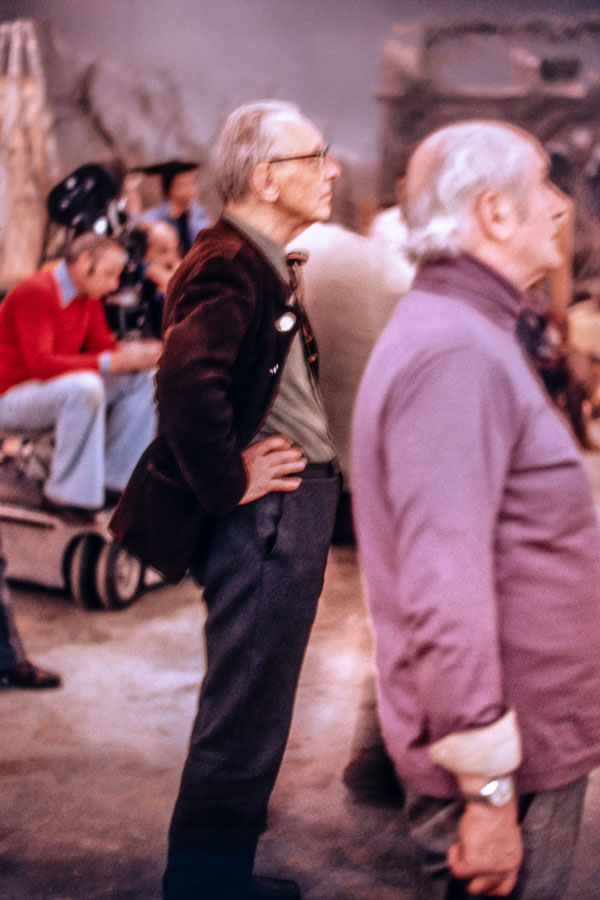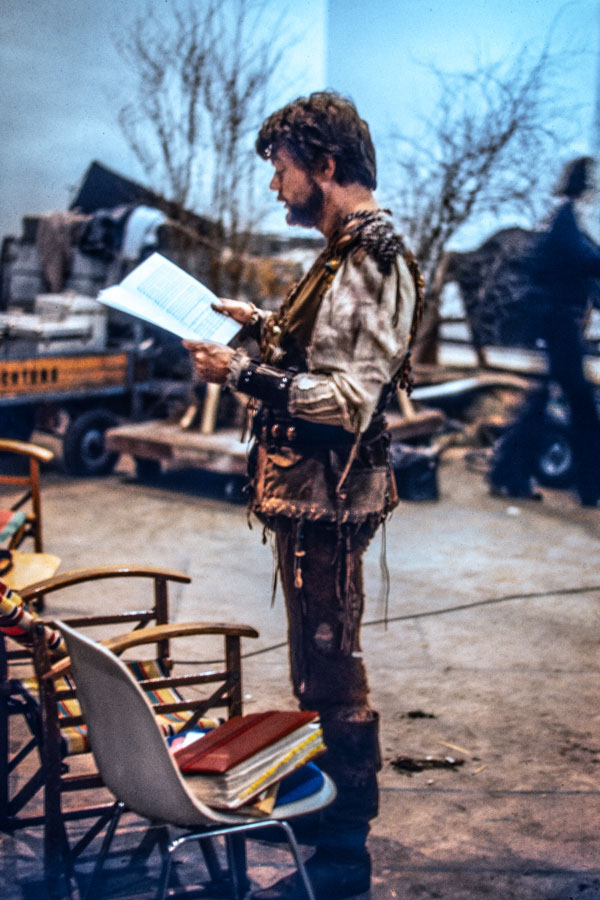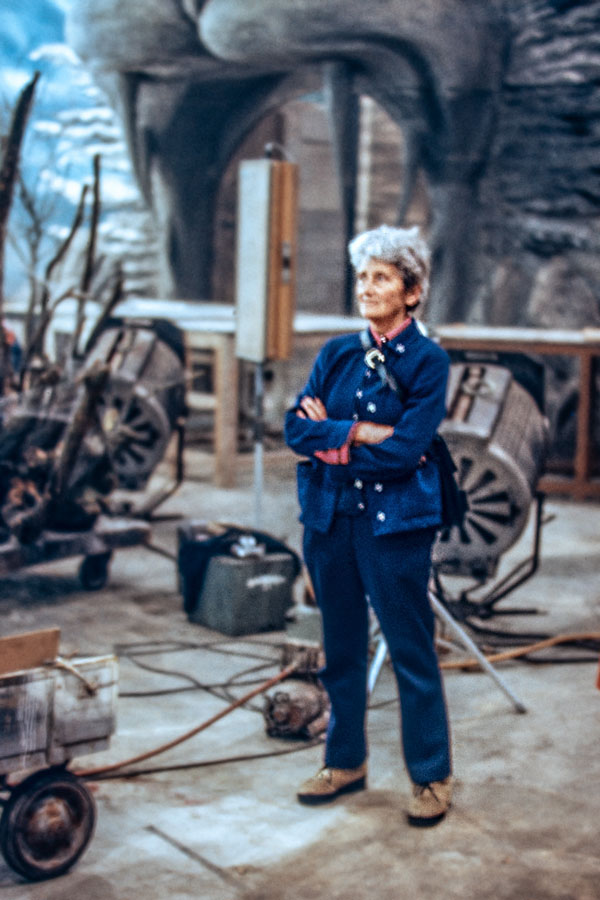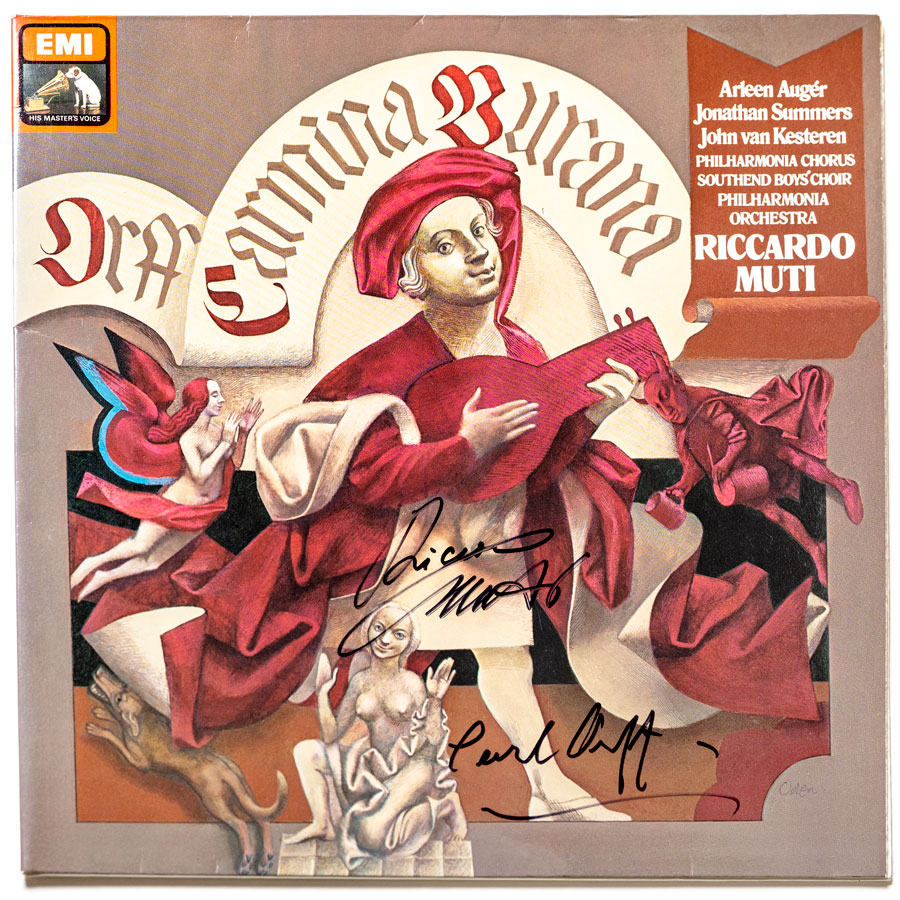1959-1982: Encounters with a genius
After my wedding to Godela Orff, I entered the Orffian world. I was fortunate enough to enter a world of which music enthusiasts can only dream. It started with the Carl Orff Week…
1959: The Carl Orff Week in Stuttgart
Walter Erich Schäfer, the general director of the Württembergische State Theater in Stuttgart, had invited the music world to Stuttgart for an eight-day Carl Orff Week. It was conceived it as a “Commitment to Orff“.
The festival week began with a matinee:
- Carl Orff and Ferdinand Leitner after the matinee
- Ferdinand Leitner, Carl Orff and choir director Heinz Mende thank all the performers and contributors.
- Great applause
11 December 1959: Premiere of “Oedipus der Tyrann
The first highlight of the week was the premiere of “Oedipus der Tyrann” (Oedipus the Tyrant) on 11 December 1959, a tragedy by Sophocles translated by Friedrich Hölderlin, with Gerhard Stolze in the title role and Fritz Wunderlich as Tiresias, Astrid Varnay as Jocasta, Hans Baur as the messenger, and others. The musical director was Ferdinand Leitner and the producer was Günther Rennert.
Performances of Orff’s works followed in later in the same week: “Antigonae”, “Der Mond”, “Trionfi”.
These were days of intense joy and pleasure for the composer Carl Orff, who was deeply revered at this theatre. Orff was relaxed, cheerful and radiated wit and charm.
1959: Honorary doctorate for Orff
In this same week, Carl Orff was presented with an honorary doctorate from the Faculty of Philosophy at the University of Tübingen. As a token of his gratitude, Orff gifted the score of “Oedipus der Tyrann” to the faculty, where Friedrich Hölderlin had also studied.
Despite these spectacular events and honours, Orff remained modest and reserved, but it was clear that he was delighted to receive these exceptional tributes. No living composer before him had been similarly honoured.
Stuttgart became Orff’s “artistic home” under its artistic director Walter Erich Schäfer. All Orff’s stage works except “Antigonae” (first performed at the Salzburg Festival in 1949) and “De temporum fine Comoedia, Spiel vom Ende der Zeiten” (first performed at the Salzburg Festival in 1973) were premiered here, including the Bavarian play “Die Bernauerin” with Godela Orff in the title role as Agnes in 1947.
1960: Carl Orff in person
These were the years during which Carl Orff was at his creative peak. Whenever he had composed something new, the telephone would ring at our home, not far from Orff’s own home. Could Godela and I come?
It was never exclusively about his work. There were many deeply personal exchanges. These were wonderful hours, filled with the deepest, most valuable insights. Every time we left, his farewell would be warm, almost tender. “Come back soon!”, he would say. Every time, we would drive away with a sense of sadness, asking ourselves what triggered this feeling of melancholy when we left Godela’s father in Dießen. Unfailingly, shortly after our return home to Grafrath, the phone would ring and it would be Orff, asking whether we had arrived back safely. We guessed that this was a pretext, a sign that he was lonely and needed the warmth he may have lacked in Dießen. Essentially, Orff was a person like you and me.
This was what it was like at Christmas, too. On Christmas Eve or Christmas Day, he would visit us in Grafrath, after first going to visit his parents’ grave in the cemetery in Unteralting. Godela would cook a delicious meal, serving the dishes she knew were her father’s favourites. Lebernockerlsuppe and other Bavarian delicacies which he particularly loved. One could tell how comfortable he felt at home with his daughter in what had been his parents’ house. Every year, the nativity scene, which Godela arranged differently every Christmas, and the imaginatively decorated Christmas tree would be admired. He would lie on the floor and look up at the tree, admiring the sight of the candles going out, one by one until it was quite dark.
Carl Orff would often call me on the telephone in my office. Usually very early in the morning – and usually to share some concern or problem. Often the topic was his health. He would ask me for my advice, ask me to recommend good doctors, as I was familiar with the medical scene in Munich. He would ask me to accompany him and open doors for him.
During these phone calls he would often talk about his daughter, about whom he was constantly worrying. “What is wrong with her now?” he would ask, and was reassured when there was nothing bad to report.
1960: Theatre evenings for Carl Orff to mark his 65th birthday
In honour of Carl Orff, the major theatres in Munich put on “Der Mond, Die Kluge”, which was Orff’s Midsummer Night’s Dream, with Godela Orff; “Die Bernauerin” with Godela Orff, the Heinz Rosen production of “Carmina Burana”.
Carl Orff’s mother and sister also attended the performances.
Asked what they thought of their son and brother being celebrated in this manner, the two ladies would modestly reply that it was “normal”, that they were used to it. But you could tell that inside they were very proud.
Paul Hindemith conducts Orff’s “Mathis der Maler”
The concert “Musica Viva” with Paul Hindemith conducting his opera, “Mathis der Maler” was an unforgettable evening. Orff had asked me whether I would like to accompany him, and we sat directly above the orchestra and followed the score.
24 March 1968: premiere of “Prometheus”
The first performance of “Prometheus”, a tragedy by Aeschylus and performed in Ancient Greek, took place on the 24 March 1968 at the Württembergische State Theatre. The musical director was Ferdinand Leitner and the producer was Gustav Rudolf Sellner.
The opera was a challenge for the performers – and the composer.
Long before the premiere took place, Carl Orff had spent hours rehearsing with the soloists at his house in Dießen, preparing them for the challenge of actually performing this work on stage. He had played sections on the piano for then, sung them and had introduced them to the complexities of pronouncing Ancient Greek. One of the evening’s protagonists, Carlos Alexander, wrote that Orff had introduced him to the piece three years before it was first performed. (In: “Carl Orff. Ein Gedenkbuch”, published by Hans Schneider, Tutzing, in 1985).
During this period, Godela also often visited her father in Dießen and reported that only in the Ancient Greek language could Orff “hear his music”. She was there during the rehearsals with the singers. The brilliant teacher Orff succeeded in making what was difficult seem easy, and familiarizing the performers with this work, which was so challenging to produce and perform. He reassured the singers: “If you forget the lyrics, simply sing ‘Kyriazi, Kyriazi’ (Ed: the name of a popular cigarette brand). Nobody will notice!” But there was no need to resort to such subterfuge: the premiere was an overwhelming success, not least thanks to the efforts of the very impressive production and the intense dedication of the singers and the orchestra. Moments like this remain indelibly imprinted in my memory.
Despite the success of the premiere there was always the anxious question of what the music experts thought. Woe betide any unqualified reviewers. Orff came to our hotel room in Stuttgart and discussed the press with Godela.
- Carl Orff studying the papers hot off the press
- An attentive listener
- Godela in a lively discussion with her father
- The great artistic affinity between the two – revealed in moments such as these
The morning after the premiere of “Prometheus”
- Congratulations from Godela and composer Wilfried Hiller
- Godela Orff congratulates Carlos Alexander on his brilliant portrayal of “Prometheus”
- A typical gesture by Gerhard Lenssen, a composer and conductor who was very familiar with Orff’s work. Godela Orff can be seen in the background
5 March 1972: photo session with Carl Orff…
Orff invited me to take some photographs of him in his study in Dießen. As usual, it marked the start of an engrossing and productive dialogue…
- His pipe was always within reach….
- Carl Orff reading his score
- A discussion about current geopolitical events
- A critical examination of his score
- Engrossed in his score
- Always a brilliant conversational partner
- Philosophizing about the past and the future
- And yet another highly critical look at his score
20 August 1973: Premiere of “De temporum fine comoedia”
The final highlight of Carl Orff’s oeuvre was the premiere of “De temporum fine Comoedia – Das Spiel vom Ende der Zeiten – Vigilia” at the Salzburg Festival. It was conducted by Herbert von Karajan and directed by August Everding.
Note: An interpretation of this work can be heard on this website in the chapter Audio: Godela Orff guides listeners through De temporum fine Comoedia by Carl Orff – an audio world premiere
- Ovations for Carl Orff after the world premiere
- “Hand in hand“: Carl Orff and director August Everding in the foyer of the theatre
Pictures from the morning after the world premiere of his “De temporum fine Comoedia – Das Spiel vom Ende der Zeiten – Vigilia”.
- A happy and contented Carl Orff!
- The first to congratulate him: Godela Orff
- A lively circle: Godela Orff, Orff instrument maker Klaus Becker, Liselotte Orff, Gunild Keetman, Carl Orff
- Carl Orff, Klaus Becker
- Carl Orff, Klaus Becker, Liselotte Orff
- Close friends for decades: Carl Orff and Gunild Keetman, the co-creator of the “Orff-Schulwerk”
- “Halihalo” was Gunild Keetman’s signature greeting when she arrived – and when she left again …
1974: Presentation of the Romano Guardini Prize to Carl Orff at the Catholic Academy in Munich
Receiving the Romano Guardini Prize was one of the most prestigious honours in Carl Orff’s life.
- Carl Orff holding his speech
- Werner Heisenberg speaking at the ceremony for the presentation of the Romano Guardini Prize to Carl OrffOrff
- Cardinal Doepfner congratulates the prize winner
- Maria Seifert, née Orff, Carl Orff’s sister
1970: A dialogue between father and daughter at Carl Orff’s house
- Feeding the goldfish. Orff’s St. Bernhard, “Bari”, was always around…
- Discussing current events
- Listening with critical concentration …
- Godela digs deeper
- Her father is sceptical
- Food for thought …
- There are still many questions remaining
1975: Honorary citizenship of the city of Munich
In the old city hall of Munich, Professor Dr. h.c. Carl Orff was awarded the honorary citizenship of the state capital of Munich.
- Receiving the honorary citizenship of Munich from Mayor Kronawitter
- Carl Orff addresses the audience
4 May 1975: Carl Orff reads from “Die Bernauerin” in a matinée.
- Poster advertising the matinée by Carl Orff
- Thanking the audience
- The 1st chairman of the theater community, City Councilor Jakob Baumann, thanks the composer with a “new instrument”, a cowbell
- … Orff leaves the stage with a smile
- Signing his book “Bairisches Welttheater”
- A light-hearted mood
- Carl Orff and Liselotte Orff. In the foreground is Hannelore Gassner, his long-standing archivist
- Waiting for her father …
- “Dede” – C.O.’s routine farewell. In the background is the “chauffeuse”, Liselotte Orff
10 July 1975: Carl Orff’s 80th birthday
The grand celebration for Orff’s 80th birthday at the Munich State Opera with the unveiling of a bust of Carl Orff.
The speakers included Orff’s publisher Willy Strecker, the State Music Director Günther Rennert, celebrities from the Munich State Opera. The bust stands in one of the world’s premier opera houses. It is a mirror of the great names in music: W.A. Mozart, L. v. Beethoven, G. Verdi, V. Bellini, G. Puccini, R. Wagner, R. Strauss.
- In great spirits: Carl Orff and Wolfgang Sawallisch entering the opera house
- Walking up to “Mount Olympus”
- Orff’s publisher Willy Strecker holds a speech praising and honouring his most successful contemporary composer
- Orff listens carefully to his publisher’s words
- Carl Orff deeply engrossed in the speech of the director and artistic director of the Bavarian State Opera, Munich, Günther Rennert
- Günther Rennert’s words raise a smile
- Warm congratulations from artistic director Günther Rennert
- Carl Orff admonishes his bust: “Make sure that my works are performed here!”
- Carl Orff encourages the directors of the Bavarian State Opera to perform his works on this stage
- In great spirits and full of charm …
- Theatre man Carl Orff – completely in his element
- A wryly positive reaction from musical director Günther Rennert
- A thoughtful listener: Wolfgang Sawallisch
- Carl Orff charms a delighted reporter
Concertante performance of Carl Orff’s new version of “Prometheus” attended by the composer
One of the highlights of the composer’s 80th birthday celebrations on 10 July 1975 was the concertante performance of the new version of “Prometheus”, directed by Rafael Kubelik as part of the Musica viva series of concerts.
CD production of Carl Orff’s new version of “Prometheus” attended by the composer
On 1/2 October 1975, the new version of “Prometheus” was recorded, again with Rafael Kubelik and the Bavarian Radio Symphony Orchestra, and again in the presence of the composer.
1975: a film is made of “Carmina Burana”
Carl Orff asked me to accompany him to the film adaptation of “Carmina Burana” by Jean-Pierre Ponelle at the Bavaria Film Studios in Munich Geiselgasteig.
- Jean-Pierre Ponelle directing during the shooting of “Carmina Burana” in 1975
- Jean-Pierre Ponelle and the film team on the set
- Carl Orff and Gerhard Lenssen are captivated on the set of Carmina Burana
- Hermann Prey studies the score before his performance
- Gunhild Keetman watches the filming
23 June 1980: Carmina Burana” in Berlin
One of the last and perhaps the greatest highlights in Carl Orff’s life was his trip to Berlin to see “Carmina Burana” being performed on 23 June 1980 by the Berlin Philharmonic with conductor Riccardo Muti. This was two years before Orff’s death.
Liselotte Orff had asked me and Godela to accompany her husband, a request I was only too glad to fulfil. At the same time, I was highly conscious of the responsibility and the need to keep an eye on Carl Orff day and night. He was not well and we were already afraid that the flight to Berlin would be too much, plus the exertion of checking in to the hotel, the rehearsals and the actual performance. But the moment his music started, Carl Orff forgot everything. After the stupendous performance I accompanied him up onto the stage. His words, “This is the second premiere of my Carmina Burana”, were met with a never-ending storm of cheers from the orchestra, the choir and the audience. It was a deeply moving moment.
Backstage, in the artists’ lounge, Carl Orff and Riccardo Muti signed copies of the new recording of “Carmina Burana”.
The days in Berlin were very exhausting for Carl Orff. He was restless during the night after the performance, getting only two or three hours of sleep. Then he was awake again and he talked and talked and talked… We heard so many astonishing instances from his life, from a very personal and intimate point of view.
10 July 1980: Orff’s Greek Dramas at Circus Krone
The final performances in Carl Orff’s life were unforgettable events.
His Greek dramas at Circus Krone in 1980 – in honour of his 85th birthday!
Initially, Carl Orff had vehemently rejected the idea that his greatest works should be performed in a circus. He was insulted that the city of Munich did not consider it necessary to perform his works on one of the city’s major stages. Godela Orff wrote in her book “Mein Vater Carl Orff und ich” (copyright by Henschel Verlag in der Seemann Henschel GmbH & Co.KG.) that he raged and complained: “Am I to be relegated to the monkeys?”. “Finally, though, Orff gave up his resistance and allowed himself to be persuaded that these performances were a great experiment and that they were the continuation of the great success of the performance of his Greek dramas in Athens” (ibid.) It was a terrific success. Orff was universally acclaimed and honoured!
Godela and I sat next to him in Circus Krone during the performance. He was utterly engrossed, following the score, note by note in complete rapture – he was no longer “there”. Nobody could tell what Carl Orff was thinking in those moments.
Carl Orff’s final days come
Carl Orff was very ill. He was only allowed to leave the hospital for these performances at Circus Krone.
Godela visited her father as often as she could. The following exchange is from one of her very last visits:
Carl Orff passed away on 29 March 1982
“The end of all things will be the oblivion of all guilt…”
This declaration by Carl Orff in his “De temporum fine comoedia – Das Spiel vom Ende der Zeiten – Vigilia” becomes clear here:
At Carl Orff’s request, his body was buried in a crypt at Andechs Monastery. On it is written:
SUMMUS FINIS
Gerhard Büchtemann
28 May 2023

